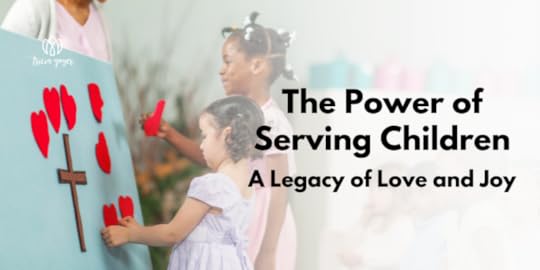Tricia Goyer's Blog, page 28
October 27, 2024
What It Looks Like to Follow Jesus
Have you ever felt the tug on your heart to truly follow Jesus, but wondered what that actually looks like? I’ve been there. I remember the days when I longed to go deeper in my relationship with Christ, but the path seemed uncertain. Then one day, I stumbled across John 12:20-36, and it felt like Jesus was speaking directly to me. His words, “Those who love their life in this world will lose it, and those who care nothing for their life in this world will keep it for eternity,” opened my eyes to a new way of living—one that’s less about me and more about serving others. In this article, I want to walk with you through this passage and explore what it means to follow Jesus with everything we have.
 Understanding John 12:20-36
Understanding John 12:20-36The passage begins with some Greeks who came to Philip, asking if they could see Jesus. I can picture this moment—people from all over hearing about the miracles, the healings, the teachings, and wanting to see for themselves. But instead of a simple “yes,” Jesus used their inquiry as an opportunity to reveal a deeper truth.
The Greeks Who Sought JesusThese Greeks, likely Gentiles, represent how Jesus’ message wasn’t just for the Jews, but for everyone. They had heard about Jesus and wanted to know Him. I think that’s where a lot of us start, isn’t it? We hear about Jesus and we come seeking, hoping He’ll speak to our hearts.
Jesus’ Response to Their InquiryBut Jesus doesn’t just give us a surface-level answer. He goes deeper. He speaks about His upcoming death and what it means to follow Him. His words about a grain of wheat falling to the ground to produce many seeds are a beautiful metaphor for what’s to come—for His sacrifice and for the kind of life He’s calling us to.
The Key Verses: Losing Life to Gain Eternal LifeThose who love their life in this world will lose it. Those who care nothing for their life in this world will keep it for eternity. John 12:25, NLTThis verse hit me hard the first time I read it. We live in a world that encourages us to hold tightly to our lives, our dreams, our comforts. But Jesus says the opposite—if we cling too tightly, we’ll lose everything. It’s a counter-cultural message, but one that brings so much freedom once we understand it.
Those who care nothing for their life will keep it.
It’s not that we don’t care about our lives—it’s that we’re willing to let go of our hold on them. When we shift our focus from ourselves to Jesus, we find the true meaning of life. I’ve found this to be true over and over in my own journey—when I give my worries, plans, and desires to God, He replaces them with something even better.
What Does It Mean to Follow Jesus?I won’t sugarcoat it—following Jesus comes with a cost. It means giving up our worldly desires and choosing to serve others, just as Jesus did. But I’ve learned that the cost is worth it every time.
Giving Up Worldly DesiresThe more I follow Jesus, the more I realize that the things I used to hold dear—status, success, comfort—don’t hold a candle to the peace and purpose I’ve found in Him. Letting go of these things isn’t easy, but it’s freeing.
Embracing a Life of ServiceOne of the most beautiful things about following Jesus is that He calls us to serve. Whether it’s serving my family, my community, or someone in need, I’ve found so much joy in living a life focused on others. Jesus set the example by washing the feet of His disciples, and He invites us to do the same.
Where Is Jesus?Jesus is with the Poor and NeedyI’ve often asked myself, “Where is Jesus in the midst of all the chaos in the world?” And then I remember—Jesus is with the poor and needy. He’s with the people who are hurting, the ones society often overlooks. If we want to follow Him, we need to go where He is. That might look like volunteering at a homeless shelter, donating to a food bank, or simply offering a kind word to someone who feels invisible.
Jesus is with the BrokenheartedThere have been times in my life when I’ve felt completely broken, but it’s in those moments that I’ve felt Jesus the closest. Psalm 34:18 says, “The Lord is close to the brokenhearted,” and I’ve seen this play out time and time again in my own life and in the lives of others.
Jesus is with Those Going Through Hard TimesJesus is with us in the hard times, too. Whether we’re dealing with financial struggles, health issues, or emotional pain, He’s there, whispering, “Do not fear, I am with you.” He doesn’t promise to take away our troubles, but He promises to walk through them with us. That’s a promise I cling to daily.
How Can We Serve Like Jesus?So, how do we follow Jesus’ example in our daily lives? For me, it starts with being intentional—looking for opportunities to serve the people around me. Whether it’s my kids, my husband, or my neighbors, I try to keep my eyes open to ways I can show them the love of Christ.
This is the heart of the Gospel, isn’t it? To love others as Christ has loved us. It sounds simple, but it’s one of the hardest things we’re called to do. And yet, when we choose to love, we’re reflecting Jesus to the world around us.
Jesus with the Widow and OrphanJesus had a special place in His heart for the widow and orphan, and He calls us to do the same. This is something that has deeply resonated with me, especially through my family’s journey of adoption. When we open our hearts and homes to those who are forgotten, we’re living out Jesus’ love in a tangible way.
Jesus Comforts the MournersI think of Mary and Martha, mourning the loss of their brother Lazarus, and how Jesus showed up in their grief. He didn’t offer empty words or platitudes—He wept with them. That’s the kind of love we’re called to offer those who mourn.
Jesus and the Curious CrowdsJesus didn’t shy away from people who were curious about Him. He took the time to answer their questions and share the truth with them. As someone who writes about faith, this is a reminder for me to always be ready to share why I believe what I believe, but to do so with love and patience.
Jesus and the ChildrenI love how Jesus welcomed children with open arms. In a world that often overlooks the vulnerable, He made it clear that they were precious in His sight. It’s a beautiful reminder for us to care for the innocent and to have a childlike faith.
How Can We Show Love Like Jesus?There are so many people who feel unloved and forgotten. Maybe it’s the single mom down the street, the elderly neighbor, or the coworker going through a tough time. We can show them Jesus’ love through small acts of kindness—things as simple as a handwritten note, a warm meal, or an offer to listen.
Comforting Those Who MournWhen someone is grieving, words often fall short. But being present, offering a shoulder to cry on, or simply sitting with them in their sorrow can speak volumes. I’ve learned that sometimes the best way to love someone is just to be there.
Helping Those in CrisisLife is messy, and people go through all sorts of crises. Whether it’s a financial struggle, a health scare, or a family issue, we can be the hands and feet of Jesus by stepping in and offering practical help. It’s not always convenient, but it’s what Jesus would do.
One of the most challenging but rewarding aspects of following Jesus is being where He is—serving the least, the lost, and the lonely. It requires intentionality and a heart of compassion, but I’ve found that when I step into these spaces, I encounter Jesus in the most unexpected ways.
The parable of the Good Samaritan has always been one of my favorites. It’s a reminder that love and service go beyond our comfort zones. It’s not about who’s deserving—it’s about loving everyone, just as Jesus does.
Following Jesus Without FearThese words from Jesus are like a balm to my soul. Life can be scary, especially when we step out in faith to follow Him. But Jesus assures us that we don’t need to be afraid—He’s with us every step of the way.
Following Jesus isn’t easy, but it’s the most rewarding journey you’ll ever take. It’s a call to step outside of ourselves, to love, serve, and walk alongside those who need us m
Want more insight? Join us in reading Job on the Daily Bible podcast!  LISTEN &
LISTEN &  WATCH
WATCH
Weekly readings for the Daily Bible Podcast with Tricia and Michelle
October 28Mark 13:32-37, Matthew 24:36-51, Luke 21:34-38, Matthew 25:1-46
 Be Ready: Lessons on Vigilance
Be Ready: Lessons on VigilanceIn today’s readings, we see Jesus delivering crucial messages about the importance of vigilance and readiness for His return. From the Gospels of Mark, Matthew, and Luke, Jesus uses parables and direct teachings to emphasize the need to stay spiritually awake and prepared for what is to come.
Mark 13:32-37, Matthew 24:36-51, Luke 21:34-38: Watchfulness in UncertaintyIn Mark 13:32-37, Jesus highlights that no one knows the exact day or hour of His return—not the angels, nor even the Son, but only the Father. Jesus compares this uncertainty to a master leaving his servants in charge of his household, urging them to be watchful so they are ready for his return.
Similarly, in Matthew 24:36-51, Jesus draws a parallel between His return and the days of Noah, where people were going about their daily lives, unaware of the coming flood. He encourages His disciples to stay vigilant, warning them to be like a homeowner prepared for a thief in the night. The message is clear: faithfulness, readiness, and vigilance are required, even when we don’t know when He will return.
In Luke 21:34-38, Jesus further warns His followers not to let their hearts be dulled by the cares and distractions of this life. He urges them to stay alert and pray for strength, knowing that the challenges of life could easily lead them astray.
Matthew 25:1-46: Parables of PreparationIn Matthew 25, Jesus continues with a series of parables that highlight the importance of being ready for His return.
The Parable of the Talents illustrates the significance of stewardship. A man going on a long journey entrusts his wealth to his servants. Two of the servants wisely invest and multiply the money, while one buries it out of fear. The master praises the first two but harshly rebukes the third for his laziness. The lesson here is that we must be faithful with what God has given us, using our talents, resources, and opportunities for His glory.
Next, The Parable of the Sheep and the Goats emphasizes that when the Son of Man returns, He will separate people as a shepherd separates sheep from goats. The sheep, representing the righteous, are those who serve and love others, while the goats, representing the unrighteous, are those who failed to show love. Jesus reminds us that our love for others is a reflection of our love for Him, and serving “the least of these” is like serving Him directly.
Word of the Day: VigilanceDefinition: the quality or state of being wakeful and alert; a high degree of attentiveness and responsiveness.
Application #1:In these passages, the theme of vigilance runs throughout Jesus’ teachings. He calls us to be spiritually awake, aware, and prepared for His return—whenever that may be.
Jesus warns against becoming complacent, distracted by the cares of the world or the pursuit of fleeting pleasures. In Luke 21:34, He says:
“Watch out! Don’t let your hearts be dulled by carousing and drunkenness, and by the worries of this life.”
We are called to guard our hearts and to ensure that we are not consumed by worldly distractions. Life’s trials and temptations can dull our spiritual senses, making it harder to recognize the urgency of our faith. Vigilance means actively fighting against spiritual complacency, making sure we remain focused on God’s purpose for us.
Jesus also tells us to pray continuously for strength and endurance. We may not know when He will return, but we do know that staying connected to Him through prayer and devotion will prepare us for that day.
Application #2:1 Peter 5:8 reminds us to be vigilant because our enemy, the devil, prowls around like a roaring lion, looking for someone to devour. Vigilance in our spiritual lives is not just about waiting for Jesus’ return, but also about being alert to the enemy’s attacks.
How can we apply this to our daily lives?
Serve others with love. As we see in the parable of the sheep and the goats, we are called to serve those around us, especially the “least of these.” This service is a reflection of our love for God and an act of vigilance in keeping our hearts aligned with His purposes.
Stay connected to God through prayer and scripture. Vigilance requires constant communication with God, keeping our spiritual ears open to His guidance and leading.
Guard against distractions. The worries of this life can easily draw our attention away from what truly matters. Jesus’ words remind us to remain focused on Him, even when life gets overwhelming.
Be a good steward. Like the servants entrusted with their master’s wealth, we must be faithful with the resources and opportunities God has given us. Whether it’s time, talents, or treasures, how we manage what God has given reflects our readiness for His return.
October 29Mark 14:1-2, Matthew 26:1-5, Luke 22:1-2, Mark 14:10-11, Matthew 26:14-16, Luke 22:3-6, Mark 14:12-16, Matthew 26:17-19, Luke 22:7-13, John 13:1-17, Mark 14:17-26, Matthew 26:20-30, Luke 22:14-30, John 13:18-30
 The Final Week: Jesus’ Call to Communion
The Final Week: Jesus’ Call to CommunionIn today’s readings, we are walking through the final days of Jesus’ earthly life, full of significant moments and teachings. We can only imagine what was going through His mind as He knew exactly what was ahead, yet continued to love and serve those around Him.
Mark 14:1-2, Matthew 26:1-5, Luke 22:1-2: Plot to Kill JesusIn these passages, we see the chief priests and religious leaders looking for a way to capture Jesus quietly, fearing the crowds’ reaction if they did it during the Passover. Yet, even in their plotting, the timing of events happens exactly as God had planned. Jesus was in control, and the timing of His sacrifice was perfectly aligned with God’s divine plan, fulfilling the prophecies that had been spoken long before.
Mark 14:10-11, Matthew 26:14-16, Luke 22:3-6: Judas’ BetrayalJudas—one of Jesus’ own disciples—bargains with the religious leaders to betray Jesus. Motivated by Satan’s influence and greed, he agrees to hand Jesus over for thirty pieces of silver. This marks a pivotal moment of betrayal in the narrative, showing how even someone who walked closely with Jesus could be led astray by sin and temptation.
Mark 14:12-16, Matthew 26:17-19, Luke 22:7-13: Preparing for the PassoverJesus sends His disciples ahead to prepare the Passover meal, giving them very specific instructions, almost like a secret mission. They are to follow a man carrying a jar of water, ask him for the guest room, and find the place already prepared. This reflects Jesus’ divine knowledge and intentionality—everything was set in motion, leading up to the meal that would become the Last Supper.
John 13:1-20: Jesus Washes the Disciples’ FeetAt the Last Supper, Jesus performs an incredible act of humility: He washes His disciples’ feet. This was an extreme act of servanthood, especially given that He was their Teacher and Lord. Jesus knew that His time had come, and yet, instead of focusing on Himself, He turned His attention to serving and loving His disciples, even though He knew they would soon abandon Him.
His action teaches us the importance of humility, love, and servanthood in our lives. Despite knowing their failures and weaknesses, Jesus chose to serve them to the very end, modeling the kind of love we are called to show one another.
Mark 14:17-26, Matthew 26:20-30, Luke 22:14-30, John 13:18-30: The Last SupperAt the Last Supper, Jesus breaks bread and shares the cup with His disciples, establishing the New Covenant through His body and blood. This meal is deeply significant, not just as a moment of farewell, but as an invitation to participate in God’s eternal plan of redemption.
In breaking the bread and sharing the wine, Jesus connects His sacrifice with the ongoing spiritual nourishment we receive through communion with Him. It’s a reminder that Jesus’ body was broken and His blood was shed so that we could experience new life in Him.
Word of the Day: KnowingDefinition: the state of being aware or informed; having or reflecting knowledge, information, or intelligence.
Application #1:Throughout these passages, we see that Jesus was all-knowing. He knew the hearts of His disciples, He knew the events that were about to unfold, and He knew the depth of His love for His followers.
This word, knowing, points us to the profound truth that Jesus knows us completely—our thoughts, our struggles, and our future. Hebrews 4:15-16 tells us that we can approach Him with confidence because He understands our weaknesses and yet offers us grace and mercy.
We can find comfort in knowing that even when life feels uncertain, Jesus knows exactly what is going on. He is never surprised or caught off guard, and His love for us remains steadfast, no matter what.
Jesus’ knowledge is not just intellectual; it is deeply personal. He knows us individually and intimately, and He desires for us to draw near to Him, just as He drew near to His disciples at the Last Supper.
Application #2:In light of this, we are also called to follow Jesus’ example of servanthood and humility. When Jesus washed the disciples’ feet, He showed us that true leadership and love are found in serving others, not in seeking power or recognition.
Are there areas in our lives where we need to humble ourselves and serve others more freely? Maybe it’s in our relationships, our workplaces, or our communities. Just as Jesus knelt before His disciples, we can follow His example by loving those around us in tangible, humble ways.
As we approach communion with Jesus, whether in prayer or through participating in the Lord’s Supper, we are reminded that He is not distant but intimately involved in every detail of our lives. He invites us to bring our struggles, our joys, and our whole selves to the table, where He offers us life, grace, and redemption.
October 30John 13:31-38, Mark 14:27-31, Matthew 26:31-35, Luke 22:31-38, John 14:1-15:17
 An Everlasting Friend
An Everlasting FriendIn today’s reading, we journey through some of the final, intimate moments Jesus shared with His disciples before His crucifixion. These moments are filled with deep teaching, warnings, promises, and a profound expression of love. Let’s walk through them:
John 13:31-38, Mark 14:27-31, Matthew 26:31-35, Luke 22:31-38: Jesus Predicts Peter’s DenialAfter introducing the Sacrament of Communion, Jesus begins to reveal what is to come. The disciples, still grappling with their position among each other, continue to argue about who is the greatest, even after spending so much time with Jesus. In response, Jesus emphasizes again that greatness comes from serving others—a central theme in His ministry.
Then Jesus turns to Peter and warns him that he will soon face a great test. Jesus tells Peter that although Satan has asked to sift him like wheat, Jesus has prayed for him—a powerful revelation of how Jesus cares for His disciples. Even when Peter boldly declares his loyalty, Jesus informs him that before the rooster crows, Peter will deny Him three times.
This interaction shows both Jesus’ foreknowledge of events and His compassion for Peter, even as Peter would falter. Despite the impending failure, Jesus reassures Peter that his faith will not ultimately fail, and once Peter is restored, he is to strengthen his brothers.
John 14:1-15:17: Jesus Comforts His Disciples and Promises the Holy SpiritAfter the warning of Peter’s denial, Jesus continues to offer words of comfort and encouragement to His disciples. He speaks of obeying His commandments, promising that He will not leave them as orphans but will send them an Advocate, the Holy Spirit, who will dwell in and among them, leading them into truth.
Jesus reassures them that He will return, but in the meantime, they must remain connected to Him, like branches to a vine, in order to bear fruit. Without Him, they can do nothing, but with Him, their lives will bear fruit for God’s kingdom.
The metaphor of the vine and branches also emphasizes the importance of remaining in Jesus’ love through obedience to His commands. As they remain in Him, their joy will overflow, and they will experience the fullness of life that only He can offer.
In this teaching, Jesus delivers an incredibly tender and surprising message: He calls them His friends. In the context of the time, this would have been shocking, as rabbis and disciples were not considered friends. Yet, Jesus invites His followers into a relationship of love, trust, and friendship—one that surpasses the traditional teacher-student dynamic. Jesus’ love for His disciples is so great that He will lay down His life for them, showing that there is no greater love than this.
Word of the Day: FriendDefinition: a person who has a strong liking for and trust in another; someone with whom one shares a close, mutual relationship.
In today’s passages, the word friend takes on a profound spiritual meaning. Jesus, the Son of God, calls His disciples friends—not just servants. This friendship isn’t based solely on duty or obligation; rather, it’s rooted in love, loyalty, and sacrifice.
Jesus demonstrated the greatest act of love by giving His life for His friends. In doing so, He established a model for what true friendship looks like: selflessness, loyalty, and a willingness to serve and sacrifice for the benefit of others.
Application #1:Jesus calls us into this same intimate friendship with Him. He desires to be more than just a distant figure or teacher in our lives; He wants to be our closest friend, someone we can confide in, rely on, and trust completely.
This friendship is based on abiding in Him, staying connected to the vine, and obeying His commandments. As we cultivate our friendship with Jesus, we also learn to serve others with the same kind of selfless love that He demonstrated.
In reflecting on this friendship, consider:
Are you abiding in Jesus, staying connected to Him as the source of your life and strength?How does your relationship with Jesus influence your friendships with others?Are there areas in your life where you can serve and love others more fully, as Jesus has loved you?Application #2:In Jesus’ teachings, we are reminded that friendship with Him isn’t just about obedience or following rules; it’s about love. “There is no greater love than to lay down one’s life for one’s friends” (John 15:13). Jesus has already demonstrated this love for us, and now He calls us to show this kind of love to others.
As we reflect on this profound truth, we can also remember that Jesus is the truest friend we could ever have. He knows our deepest struggles, our greatest fears, and our most hidden thoughts—and yet, He loves us unconditionally.
So, let us live out this friendship by:
Loving others sacrificially, just as He has loved us.Remaining in His love, spending time with Him in prayer, worship, and reflection.Obeying His commands, which flow from love, not duty.October 31John 15:18-17:26
 The Advocate: Jesus’ Final Words of Comfort and Strength
The Advocate: Jesus’ Final Words of Comfort and StrengthIn today’s reading from John 15:18 through John 17, we witness Jesus preparing His disciples for the challenges they will encounter as His followers. He is clear and upfront: the world will oppose and hate them because of their association with Him, just as it hated Him first. Jesus makes it known that living as His disciple means not conforming to the values of this world but remaining faithful to Him, even in the face of hardship.
But Jesus doesn’t leave His disciples, or us, without hope. In fact, He offers the ultimate comfort: the promise of the Holy Spirit.
In John 15:26, Jesus says, "But I will send you the Advocate—the Spirit of truth. He will come to you from the Father and will testify all about me."The Holy Spirit is more than just a guide; He is our Advocate, our helper, and the One who stands alongside us through life’s trials. Jesus tells His disciples that His departure is necessary for the Spirit to come, and when He does, He will convict the world of sin, righteousness, and judgment, and empower His followers for the work ahead.
As Jesus shifts to His High Priestly Prayer in John 17, He turns to the Father not just for His own strength, but for the protection and unity of His disciples. Jesus prays:
“Holy Father, protect them by the power of your name, the name you gave me, so that they may be one as we are one.” —John 17:11In these words, we see Jesus’ deep love for His disciples. He prays not only for their safety but also for their unity, that they may be one just as He and the Father are one. This unity is essential because it’s through their oneness that the world will know they belong to Him.
Jesus goes further to pray for all believers, including us, asking that we too would be protected from the evil one and kept strong in faith. His heart’s desire is for all of us to be united in love and mission, sharing His truth with the world.
The world may bring sorrow, but Jesus promises that our sorrow will turn to joy. His victory is assured, and He encourages us to pray in His name, promising that our prayers will be heard and answered. Even as He prepared for the cross, Jesus remained focused on the needs of His disciples and all future believers, ensuring that we would never be left alone.
Word of the Day: AdvocateDefinition: one who pleads another’s cause, who helps another by defending or comforting him.
Jesus is our Advocate, and He has sent the Holy Spirit to be our constant companion, guiding and empowering us in this journey of faith. When we feel overwhelmed, we can take comfort in knowing that the Spirit is actively interceding on our behalf and leading us toward the truth.
Application:In times of trial, we need to remember that we are not alone. Jesus is our Advocate—He prays for us, He intercedes for us, and He walks with us through the power of the Holy Spirit. When the world pushes back, or when life feels overwhelming, turn to Jesus and the Advocate He has sent. Let the Spirit fill you with peace, strength, and wisdom, knowing that your prayers are heard and your steps are guided by a loving Savior.
November 1John 18:1-2, Mark 14:32-42, Matthew 26:36-46, Luke 22:39-46, Mark 14:43-52, Matthew 26:47-56, Luke 22:47-53, John 18:3-24
 Agony in the Garden: Jesus’ Final Hours of Prayer and Betrayal
Agony in the Garden: Jesus’ Final Hours of Prayer and BetrayalToday we read about the events leading up to Jesus’ arrest in the Garden of Gethsemane and the betrayal by Judas Iscariot. Each of the four gospels recounts Jesus and His disciples heading to the Garden of Gethsemane after the Last Supper. There, Jesus becomes deeply distressed and sorrowful, praying fervently to God, asking if it is possible for Him to avoid the impending suffering and crucifixion. Yet, in an act of complete submission, Jesus prays, “Not my will, but yours be done.”
In Matthew’s account, we read of Jesus’ anguish and the disciples’ inability to stay awake while He prays. Luke adds the detail of an angel appearing to strengthen Jesus as He continues to pray in agony, His sweat like drops of blood. Judas, who would later betray Him, knew the place well and led soldiers to arrest Jesus.
The word “Gethsemane” carries deep meaning, and I wanted to explore this further. According to ThatTheWorldMayKnow.com:
“The word gethsemane is derived from two Hebrew words: ‘gat,’ meaning ‘a place for pressing oil (or wine),’ and ‘shemanim,’ meaning ‘oils.’ During Jesus’ time, heavy stone slabs were lowered onto olives that had already been crushed in an olive crusher. The slab’s weight squeezed the olive oil out of the pulp, and the oil was collected. The image of the Gethsemane on the slope of the Mount of Olives provides a vivid picture of His suffering. The weight of the world’s sins pressed down upon Him like the heavy slab of the olive crusher. His sweat, ‘like drops of blood falling to the ground’ (Luke 22:44), flowed from Him like olive oil.”
This paints such a vivid picture of what Jesus endured for us. The agony in the Garden of Gethsemane shows us that even the Son of God, in His humanity, faced deep anguish, a burden so heavy that He needed an angel to strengthen Him.
Word of the Day: AgonyDefinition: extreme physical or mental suffering.
In this context, we see Jesus in true agony, both physically and spiritually. From the crushing weight of the sins of the world to the knowledge of the betrayal He would face, Jesus experienced an unimaginable depth of pain. Yet, He still surrendered to the Father’s will.
Application:As we walk through life, we, too, encounter moments of deep agony. Whether it’s the loss of a loved one, a health crisis, or personal turmoil, suffering is a part of the human experience. The Garden of Gethsemane teaches us several important lessons about how to endure these moments:
Be honest about your struggles: Just as Jesus poured out His anguish to the Father, we can openly share our deepest pains with God. We don’t need to hide our feelings in prayer.Submit to God’s will: Jesus shows us the importance of submitting our will to God’s greater plan. Even in agony, He prayed, “Not my will, but yours be done.”Lean on community: Though the disciples failed to stay awake, Jesus still sought their presence. During times of suffering, don’t hesitate to lean on your faith community for support.Trust in God’s strength: The angel who appeared to Jesus reminds us that God provides strength in our weakest moments. His grace is sufficient, even when we feel like we can’t go on.As we reflect on Jesus’ agony in the Garden, we remember that He knows our pain intimately. He walked the path of suffering before us, and now He stands ready to walk with us through our moments of anguish. Through prayer, submission to God’s will, and the support of our community, we can find hope, healing, and ultimately, peace.
November 2Mark 14:53-65, Matthew 26:57-68, Mark 14:66-72, Matthew 26:69-75, Luke 22:54-65, John 18:25-27, Mark 15:1, Matthew 27:1-2, Luke 22:66-71, Matthew 27:3-10
 The Trial of Jesus: A Lesson in Humility and Truth
The Trial of Jesus: A Lesson in Humility and TruthToday, we find ourselves walking through one of the most significant moments in history—Jesus’ trial before the high priest and His subsequent denial by Peter. It was a long, difficult night for Jesus and His disciples. After being taken into custody, Jesus was brought before the high priest, Caiaphas, where accusations against Him began to pile up, many of them conflicting and false.
At one point, the high priest directly asked Jesus, “Are you the Messiah, the Son of the Blessed One?” to which Jesus answered, “I Am.” This response sent shockwaves through the room. Caiaphas, accusing Him of blasphemy, declared Jesus guilty, and those present began to spit on and strike Him. As if His suffering wasn’t enough, Peter—one of Jesus’ closest friends—denied Him three times, just as Jesus had foretold. When the rooster crowed, Peter realized what he had done and wept bitterly.
The word “trial” takes on a double meaning here. Jesus faced a legal trial before the authorities, but He also underwent a deep spiritual and emotional trial, testing His obedience to the Father’s plan and His endurance through immense suffering.
The word “Gethsemane” itself gives us insight into the intensity of this moment. It means “a place for pressing oil,” which paints a vivid picture of the crushing weight of the world’s sins pressing down on Jesus, just as the heavy stone slabs in an olive press squeeze out the last drop of oil.
Peter, though loyal in his heart, experienced his own trial. Fear overtook him, leading him to deny the very Savior he had promised to follow to the end. Jesus, aware of Peter’s weakness, foretold this failure, but He also knew Peter would be restored. This shows us the beauty of grace: even when we fail, restoration is always possible.
Word of the Day: TrialDefinition:
A formal examination of evidence before a judge in order to determine guilt in a legal case.A test of the performance, qualities, or suitability of someone or something.Application:Enduring Trials with FaithIn our reading today, we are reminded of the trials that we, as followers of Jesus, will face in life. We can learn three crucial lessons from Jesus’ trial:
Standing Firm in Faith: False accusations may come, and we may find ourselves tested beyond our limits. Just as Jesus remained steadfast during His trial, we too must stand firm in our faith, knowing that God is our ultimate judge.The Importance of Humility: Even in the face of betrayal and injustice, Jesus demonstrated profound humility. As we navigate our trials, we are called to walk in humility, following His example, even when we are wronged.The Reality of Failure and Restoration: Like Peter, we will stumble. We may even deny our Savior in moments of weakness. But just as Jesus foretold Peter’s restoration, He also offers us the grace to return, be restored, and continue walking with Him.Trials are an integral part of our journey with Christ, whether they come in the form of accusations, personal failures, or spiritual testing. But through it all, we are reminded that Jesus walks with us, offering grace and strength to persevere.
November 3Mark 15:2-5, Matthew 27:11-14, Luke 23:1-12, John 18:28-40, Mark 15:6-15, Matthew 27:15-26, Luke 23:13-25, John 19:1-16, Mark 15:16-20, Matthew 27:27-31
 Rejection and Redemption
Rejection and RedemptionToday, we continue our journey through the final hours of Jesus’ life, and it’s hard to read about the painful rejection He faced at the hands of so many. From Pilate to Herod, from the crowds to His own disciples, rejection was a common theme.
In Mark 15:2-5 and Matthew 27:11-14, we read about how Pilate, though aware of Jesus’ innocence, bowed to the pressures of the crowd. Pilate, the Roman governor, struggled to find fault in Jesus, yet the cries of the people to “crucify Him” outweighed the truth he saw. Jesus was rejected by His own people.
Moving to Luke 23:1-12, we see that Herod was also involved in Jesus’ fate. Herod mocked Jesus, wanting to see Him perform miracles like some kind of spectacle. When Jesus did not meet his expectations, Herod sent Him back to Pilate, confirming his own rejection of Jesus.
John 18:28-40 shows us the political maneuvering of the Jewish leaders as they handed Jesus over to the Roman authorities. And again, we see Pilate desperately trying to avoid condemning Jesus, offering the crowd a choice to release either Jesus or the criminal Barabbas. The crowd chose Barabbas.
But Jesus’ rejection didn’t end there. In John 19:1-16 and Mark 15:16-20, we see Him endure further humiliation and pain. Jesus was scourged, mocked by soldiers, and dressed in a purple robe with a crown of thorns pressed into His head. They laughed at His claims to kingship, saluting Him with “Hail, King of the Jews” as they spat on Him.
Finally, Jesus was led to His crucifixion. Matthew 27:27-31 describes how the Roman soldiers took Jesus, stripped Him, and then forced Him to carry the cross on which He would die.
Word of the Day: RejectionDefinition: Refusing to accept or acknowledge someone; abandonment.
The word “rejection” means “to cast away after thorough investigation (testing); to reject after determining something is useless (unworthy).” Isn’t it sobering to think that Jesus, our Savior, was cast aside as unworthy by the people He came to save?
Yet, in this rejection, God’s plan of redemption unfolded. Jesus’ rejection was the very pathway through which salvation came to us. His suffering was not in vain; it was necessary to fulfill God’s divine purpose.
Application:Turning Rejection into RedemptionThe trial and rejection of Jesus carry profound lessons for us today. Rejection is never easy to face, but we must remember that it can be a stepping stone to something greater—just as Jesus’ rejection paved the way for the world’s redemption.
Rejection as Growth: In our moments of rejection, whether from people, opportunities, or circumstances, we can grow closer to God. James 1:2-4 reminds us that the testing of our faith produces perseverance, leading to maturity.Grace in the Pain: Like Jesus, we are not alone in our moments of rejection. When we are rejected, grace enters, offering us healing, strength, and the reminder that God has a purpose for our pain.Redemption through Jesus: Jesus’ rejection was not the end, and neither is ours. Jesus endured rejection so that we could be accepted by the Father, and through Him, we find hope, healing, and salvation.When rejection comes, let’s remember that we have a Savior who endured the ultimate rejection to bring about our redemption. His grace covers our pain, and His love gives us hope.
The post What It Looks Like to Follow Jesus appeared first on Tricia Goyer.October 25, 2024
Writer’s Desk: C.J. Milacci
 Writer’s Desk: C.J. Milacci
Writer’s Desk: C.J. MilacciAward-winning author CJ Milacci writes stories for teens and young adults with heart-pounding action and hope. As the podcast host for Read Clean YA with CJ, she loves talking about books and the deeper themes woven into the pages of each novel. She’s passionate about crafting stories of good overcoming evil, finding hope in the midst of seemingly hopeless circumstances, and true acceptance.
Always willing to get real about hard issues, C.J. also enjoys the cheesiest of puns. She chats about writing, her faith, bubble tea, and other fun adventures online (@cjmilacci) and at cjmilacci.com.
Connect with C.J. on her website, Instagram, and Facebook, and sign up for her newsletter.
More about Recruit of TalionisWhen the world falls apart, one girl must find hope in the darkness.
Seventeen-year-old Bria Averton grew up in a small town of survivors near the ruins of Portland, Maine, years after the Demise of North America. But when she is kidnapped and forced to become a soldier in the mysterious city of Talionis, she finds herself thrust into a world of danger and darkness. Unknown forces are at work in the city, and Bria soon realizes that escape is impossible. With her own guilt and the oppressive evil of the city threatening to drown her, Bria must find a way to survive…and discover if hope is possible. Even here.
Purchase a copy of Recruit of Talionis.
Enter to Win a copy of Recruit of Talionis + Abandoned Shores
*Due to shipping costs, the winner must have a US mailing address.
Q&A with C.J. MilacciARCF: The third book in your Talionis series, Enemy of Talionis, is releasing in a little over a month (congrats!) can you tell you tell us a little about the series?
CJM: The Talionis Series takes place in an imagined future where America has fallen. It’s about a teen girl, Bria, who gets kidnapped along with other teens and forced to become a soldier in a hidden city called Talionis. The series follows Bria and her friends as they face evil and darkness and have to make the decision to either give in and allow the evil to win, or stand and fight. Although there’s a dark backdrop to this series, my books always have hope woven in, and I explore themes that include finding hope in darkness and how do you follow God in a world that’s falling apart.
ARCF: What was the inspiration behind this series? And how many books do you have planned for the series?
CJM: I wanted to write a series where teens could get escape the difficult things they are dealing with for a time and enter into an adventure where the protagonist faces both bad guys attempting to ruin her life and struggles with the pain of her own past at the same time. My desire is for readers to enter the books to escape, but then close the books with something they can take with them back into their lives. I want my books to be a place where Bria and my readers can wrestle through hard questions, struggle with the pain of betrayal, learn how to stand courageously in the face of evil, find true community and found family, and discover what it looks like to follow God in a world that is full of enemies and struggles.
I have four books planned for this series. The fourth and final book will release on Kickstarter in the spring of 2025 and then everywhere in the fall of 2025.
ARCF: You’ve used Kickstarter to publish your series — and you’re doing quite well with it! What made you decide to go with Kickstarter (and can you explain the process to a reader who may not be familiar with Kickstarter)?
CJM: I decided to go with Kickstarter because I loved that it was a platform where I could connect directly with my readers and provide them with not just a book, but lots of fun extras and add-ons as well. It works almost like a super-charged pre-order where everyone who backs the Kickstarter not only gets lots of fun extras, they also receive the ebook months before it is officially released. I love being able to interact with every person who backs the campaign, and there’s something so fun and special about being able to sign the books and ship them to my backers with all the fun swag. Plus, all the backers vote on which stretch goals they want—like maps added to the book, an extra short story set in the series world, stickers, bookmarks, etc.—and it allows me to put together something my readers actually want. Not just something I think they want.
ARCF: In addition to writing, you also have a day job. How do you find time to balance all the things?
CJM: Ah balance! What a hard thing to find sometimes. One of the things I have come to realize is that I need to constantly reevaluate my priorities, assess the work before me, and continually commit it all to the Lord and ask for His direction. My schedule changes quite frequently and it’s necessary to take the time to review the things on my plate and establish a plan of action. One thing my dad likes to say is that the important things are rarely pressing and the pressing things are rarely important. When I’m reviewing my schedule, I try to keep that in mind and make sure I’m prioritizing the things God has called me to do and not lose sight of them. And I’ve also found that there is much to be said for delegating certain tasks to someone I trust so that I can do the work that only I can do. 

ARCF: What do you hope readers take away from the Talionis series?
CJM: I want them to walk away with the realization that no matter how dark things appear or how much evil seems to surround them, there can always be hope that pierces that darkness. My prayer is that God could use my stories to touch the hearts of my readers, show them more of Himself, and equip them to stand strong in the face of evil and follow Him, even when that road is hard. Especially then.
ARCF: Why YA?
CJM: I worked in youth and young adult ministry for over a decade and I have a soft spot for teens and young adults. The season of life they are in is tough and they are going through more today than seems fair. I wanted to write stories that could meet them where they are at and be a great alternative to the books being produced that are so contradictory to God and His word.
ARCF: Which character in the Talionis series is most like you?
CJM: I think there’s a little piece of me in a lot of my characters, and I don’t think one of them screams “me” more than the rest. However, I do have some family members who are convinced Bria has a lot of me in her—at least a lot of me when I was younger. So if we’re going what they think, I suppose Bria.
ARCF: You also recorded and produced the audiobooks for the first two books in the series. What were some challenges you faced when putting out your audiobooks — and where is the best place for readers to purchase the audiobooks?
CJM: It has been a lot of fun recording and producing my audiobooks, but at this point I only have book one officially released. One of my biggest challenges was my own fault: I have such a large cast of characters. And I really like different voices for every character. Which led to me being a bit annoyed with myself at times.  But the experience of seeing my books brought to life in this way has been so much fun, and it’s been worth the struggle and time it takes to produce the audio versions.
But the experience of seeing my books brought to life in this way has been so much fun, and it’s been worth the struggle and time it takes to produce the audio versions.
Recruit of Talionis is available wherever you like purchasing audiobooks. The audiobook for Fugitive of Talionis will begin to be available in a rather unique way in 2025 (until it’s finished and available everywhere). If readers are interested, they can sign up for my newsletter since that’s where I’ll be sharing the details soon.
ARCF: You also have a podcast for clean YA fiction! Can you tell us a little about it and where we can listen to episodes?
CJM: I do! Thanks for asking. My podcast is called Read Clean YA with CJ and it’s a podcast for teens and young adults (and anyone else) who want to explore exciting worlds, deep themes, and epic stories—without the objectionable content. I interview different authors about their books, discuss the deeper themes within their stories, hear the author’s heart for his or her books and readers, and provide a resource for those who are looking for excellent young adult stories that don’t include inappropriate content. I have a blast talking with other authors, and I love being able to highlight these fantastic stories. You can listen to the podcast wherever you like listening to podcasts. And you can find more information about the podcast at ReadCleanYA.com.
ARCF: What’s coming up next for you?
CJM: I’m currently working on the fourth and final book in the Talionis Series, which is rather exciting. The Kickstarter for that book will be in the Spring of 2025 and then it will release everywhere in the Fall of 2025. After I finish book four, I have a standalone project that I am very excited about, but I can’t share anything quite yet.
Want to hear more about C.J. Milacci + have an exclusive chance to win a paperback copy of Recruit of Talionis make sure you are subscribed to the Avid Readers of Christian Fiction Newsletter!
Pin, Save, + Share

 The post Writer’s Desk: C.J. Milacci appeared first on Tricia Goyer.
The post Writer’s Desk: C.J. Milacci appeared first on Tricia Goyer.
October 23, 2024
The Power of Serving Children: A Legacy of Love and Joy
By Tricia Goyer

Sometimes, we don’t see the full impact of serving others—especially children—until years down the road. I was reminded of this just the other day while reflecting on this verse:
“Let the children come to me. Don’t stop them! For the Kingdom of God belongs to those who are like these children. I tell you the truth, anyone who doesn’t receive the Kingdom of God like a child will never enter it.” - Mark 10:14-16
I smiled as I thought of John, my husband, and the joy and passion he has for children. The first time he caught my attention wasn’t during some grand display, but in a simple act of service. He was at his parents’ church, leading the kids to the living room area to share Bible stories. While John’s dad, our pastor, preached, John’s joy radiated from the other room. I had no idea that, years later, we’d be married with nine children of our own, and that John would continue to live out those words of Jesus, inviting children into his life and heart with such love.
Sometimes the most meaningful acts of service happen in the quiet moments—when we welcome the little children, we welcome the Kingdom of God.
Fast forward to today, and John’s devotion still inspires me. He’s not just a dad who serves; he’s a man who embodies that childlike faith Christ speaks of, faithfully loving our children and leading them to Jesus through daily acts of care. Just yesterday, he fixed one of our adult son’s computers, took another child to basketball practice, and helped move things into storage for our daughter. His heart for serving never fades. Even our older children are living this out, with two of our daughters now serving in a preschool in Poland. Just before we took them to the airport, John gathered us all for communion, praying over them and affirming their decision to give a year of their lives to “the least of these.”
These little moments remind me that serving children isn’t a small task. It’s kingdom work. It’s showing the heart of Jesus every day, and it’s something God cherishes deeply.
How to Appreciate and Encourage Those Who Serve ChildrenIf you’ve ever served in children’s ministry, or have been around those who have, you know it can sometimes feel like a thankless job. But what we do for children matters. Whether it’s our own kids or those in our community, we are helping shape hearts for eternity. Here are a few practical ways you can show appreciation and encouragement to those who serve children:
1. Write a Personal Note: Take a few minutes to write a heartfelt note of gratitude. Share specific moments where their service made a difference. There’s power in knowing that what we do matters, even if it’s behind the scenes.
2. Provide a Little Extra Care: Often, those who serve are always looking out for others and rarely take time for themselves. Consider offering to babysit for free, make them a meal, or give them a gift card for a local coffee shop.
3. Pray for Them (and Let Them Know): There’s no greater way to show appreciation than through prayer. Ask God to give them strength, wisdom, and renewed joy in their calling. Then, let them know you’re praying for them regularly.
4. Celebrate Their Efforts Publicly: Whether it’s on social media or within your church community, publicly affirm those who serve children. This can go a long way in helping them feel valued and seen.
5. Give Small Tokens of Encouragement: Little things like a bookmark with a Scripture verse or a candle can remind them that their work is significant. It doesn’t have to be extravagant—just thoughtful.
Serving children isn’t easy, but it’s one of the most important things we can do. We may feel weary at times, but when we remember that Jesus treasures these little ones and the care we give them, we find strength to continue. So, whether you’re a parent or someone serving in children’s ministry, know that God sees your efforts, and He values them more than you know.
And just as John has faithfully served our family and the children in our lives for over twenty years, may we all be encouraged to keep welcoming, teaching, and loving the little ones in our care—because in doing so, we reflect the heart of Jesus.
Hope and Refreshment for Homeschooling Parents
Need more ideas and advice on homeschooling? Pick up a copy of Homeschool Basics. Receive tried-and-true homeschool advice from veteran homeschooling moms Tricia Goyer and Kristi Clover. We dish out practical help on getting started and staying the course. Homeschool Basics will remind you that the best homeschooling starts with the heart. Packed with ideas to help you push aside your fears and raise kids who will grow to be life-long learners. Kristi and I believe that homeschooling can transform your life, your home, and your family. Mostly, we believe homeschooling can truly prepare your children for the life God’s called them to live. Don’t let doubts hold you back any longer. Get Homeschool Basics on Amazon Now!
The post The Power of Serving Children: A Legacy of Love and Joy appeared first on Tricia Goyer.October 22, 2024
It’s Time to Prepare to Get Healthy!
One of the best things we can do for ourselves is to prepare to be healthy—both in mind and body. As a mom of ten, I understand chaos, and I know how easy it can be to let our health slip away as we take care of everyone else. But here’s the good news: we don’t have to go at it alone! When we take intentional steps to prepare ourselves and build a supportive community, we’re setting ourselves up for success.

In my 14-Day Detox, we focus on cutting out what we don’t need, incorporating healthy habits, and leaning into a community of others on the same journey. If you’re ready to take control of your health, this is where we start!
The Power of PreparationBefore we dive into changes like drinking more water or cutting out sugar, we need a plan. One of the most powerful tools I’ve used is from Dr. Wayne Andersen’s Stop. Challenge. Choose. eBook. He explains that when we are tempted or stressed, we can stop, challenge our thinking, and make a healthier choice. This simple strategy has helped me stay on track countless times!
When you make a decision early, you don’t have to fight with yourself later.
Isn’t that freeing? When we prepare ahead of time—whether it’s by writing down our goals, planning meals, or setting up a workout routine—we remove the constant battle of “Should I eat that?” or “Should I skip the gym?” Preparation allows us to step into healthy habits without the daily struggle.
Why Health Matters to GodTaking care of our bodies isn’t just about looking good or losing weight—it’s about honoring the Creator who made us.
1 Corinthians 6:19-20 reminds us, “Do you not know that your bodies are temples of the Holy Spirit, who is in you, whom you have received from God? You are not your own; you were bought at a price. Therefore honor God with your bodies.”
When we make healthy choices—whether it’s fueling our bodies with nutritious food or getting enough rest—we’re praising God. We’re saying, “Thank you for this body, Lord. I will take care of it and use it to serve you.”
How You Can Prepare for a Healthier LifeSet Your GoalsTake a few minutes today to think about your health goals. Maybe it’s losing weight, having more energy, or getting clearer skin. Write those goals down and make them specific! For example, my current goal is to lose 5 more pounds over the next 14 days. What’s yours? Setting clear goals gives us something to aim for and keeps us motivated.Prepare Your Environment
A key part of preparation is making sure our environment supports our goals. Go through your kitchen and remove the tempting junk food. Replace it with healthy options. If you’re like me and love having a plan, try using my Lean and Green shopping list; but make sure you stick to it! Resist the temptation to add things you don’t need to your cart. You’ll feel empowered when you’re shopping for nutritious foods, and you won’t have to battle unhealthy options later at home.Incorporate Movement
Exercise is an important part of staying healthy, but it doesn’t have to be overwhelming. My daily goal is 8,000 steps. Some days I don’t hit it, but the key is making a plan to move more. Whether it’s walking around your neighborhood, dancing in your kitchen, or following a workout video, aim for small, manageable steps to get started. Our bodies were designed to move!Build Your Community
Health journeys are easier when we have support. Invite a friend or family member to join you in making healthier choices. Share your goals with each other and check in regularly. Ecclesiastes 4:9-10 reminds us, “Two are better than one, because they have a good return for their labor: If either of them falls down, one can help the other up.” Community is key to staying on track.Commit to Small Changes
Preparing to be healthy doesn’t mean making drastic changes overnight. Start small. Drink more water, replace one unhealthy snack with a healthy one, or take a short walk each day. Remember, consistency is more important than perfection. Little by little, you’ll start to feel the difference!What’s Your Next Step?
I know it can be tough to get started, but you don’t have to do it alone! If you’re ready to take the next step toward a healthier you, join me on this journey. We’ll focus on making good choices early on, so we don’t have to fight with ourselves later. We’ll also be stacking up small, healthy choices one at a time like building blocks, until you can step back and look at the beautiful tower of health you’ve built for yourself!
When you’re ready to dive into this 14-Day Detox, you’ll receive a free eBook with 14 days of Lean and Green recipes, a shopping list, and support from a community of people on the same journey. One of my favorites is the Zuppa Toscana Soup—delicious and healthy! You don’t have to make a second meal for your family either. These recipes are easy to modify and perfect for everyone.
Now is the time to say yes to your health. Treat yourself to a new water bottle, a step tracker, or a fitness mat, and get excited about this new chapter. When we take care of our bodies, minds, and spirits, we’re not just getting healthy—we’re honoring God in the process.
Ready to Start?Let’s do this together! Fill out this short form to join the next 14-Day Detox starting October 28th. We’re going to have an amazing time!
Let’s honor God by taking care of ourselves. You deserve to feel good in the body He’s given you!
Additional Resources
[image error]Making better food choices and losing weight are great goals, but spiritual health is so important, too! If you’re looking for a way to read your Bible more and to connect with God and a wonderful community, check out this podcast!
Daily Bible PodcastWe’re Tricia and Michelle, two friends inviting you to join us in reading through the Bible chronologically this year. Reading the Bible every day can be a challenge. We’re here to summarize each day’s passage and provide action steps … in under 15 minutes. Grab a buddy and join our community. Take the plunge, and let’s read through the Bible together. We’ll be cheering you on all the way!

You can join us using your own One Year Bible© (if you’d like to purchase one, you can grab your preferred version using the links below). Or you can print up the One Year Chronological Reading Plan. If you don’t have a copy of the One Year Bible©, we will have the exact passages for the next day in the show notes. You can also subscribe to the One Year Chronological Bible Reading plan on the YouVersion Bible App.
Join us here.The post It’s Time to Prepare to Get Healthy! appeared first on Tricia Goyer.October 21, 2024
Would I Homeschool Again?
By Tricia Goyer

I get asked this question all the time. As a wife of 35 years, a mom of ten—seven adopted—a homeschooler, and an author of over 90 books, people are curious. They want to know how I make it all work. And with homeschooling still being a major part of our daily life, parents often ask:
“Would you homeschool your kids again if given the chance?”
The short answer: Absolutely, yes!
We’ve been homeschooling for more than 30 years—since my oldest son, Cory, was in preschool. Over the years, we’ve experienced a lot of growth and learned many lessons alongside our children. It wasn’t always easy, but I wouldn’t change a thing. My older kids love God, serve in ministry, and remain close to us and each other. They’ve gone to college, built families, and continue to walk in faith.
Why I’d Homeschool All Over AgainFamily Bonding and Building Traditions
One of the best parts about homeschooling was the ability to bond as a family. We had time to create our own traditions, like nightly family dinners and reading aloud together. These are memories I cherish and ones my children hold dear as well. Homeschooling allowed us the opportunity to spend meaningful time together—time that we might have missed out on with a traditional school schedule.
Faith-Based Education
Another significant reason I’d choose homeschooling again is that it allowed us to integrate faith into our daily routine. We could openly pray, read scripture, and use our Christian values to shape our learning. Watching my children grow in their faith has been one of the most rewarding aspects of homeschooling. It’s woven into the fabric of who we are as a family.
Tailored Learning Experience
Every child is different, and homeschooling allowed me to tailor each child’s education to their unique strengths and weaknesses. One of my sons loved nature videos, so we spent extra time exploring that. Another child was more into literature, so we dove deep into reading and writing. In a traditional classroom, my kids wouldn’t have had the flexibility to pursue their passions like they did with homeschooling.
College and Life Success
Homeschooling wasn’t just about academics—it was about life skills too. Homeschooling gave us the freedom to explore topics at our own pace, travel, and serve together. I truly believe my kids wouldn’t be who they are today if we had chosen a different educational route. They’ve taken the lessons learned during their homeschool years and applied them to real-life situations. Homeschooling prepared them not just academically but also for life.
“Are there challenges in Homeschooling?”
The short answer: Absolutely, yes!
Homeschooling isn’t without its challenges. Let’s be real, no one ever said it was easy! There are many things we’ve struggled with. Top of the list are cost, time, and motivation … but that is true for all of parenting, right?
The Challenges of HomeschoolingFinancial Costs
Homeschooling can be costly. Between books, supplies, extracurricular activities, and the occasional tutor, the expenses add up. However, you don’t have to break the bank to homeschool. There are tons of free resources available online. Whether you want full lesson plans, unit studies, or free worksheets, you can find it. Over the years, I’ve learned to be resourceful, and I’ve discovered many budget-friendly options to keep costs low.
Also, while you can homeschool on a budget, there are times when investing in a quality curriculum or extracurricular activity is worth the cost. Things like sports, art classes, and field trips help round out your child’s education.
Time Commitment
It takes time. I’m not going to sugarcoat that. Homeschooling requires a significant investment of your time as a parent. You’re the teacher, the coach, and the administrator all rolled into one. But for me, the rewards far outweighed the commitment.
My kids typically spend 3-4 hours a day on schoolwork. When they were younger, we did everything together, side by side. As they got older, they became more independent and could knock out their work in just a couple of hours.
Homeschooling is efficient because there’s no wasted time. We aren’t sitting in a classroom waiting for attendance to be taken or for the bell to ring. My kids focus, finish their work, and then have the rest of the day to pursue other interests.
Maintaining Motivation
Keeping yourself motivated is another challenge. Homeschooling can be exhausting, and there will be days when you question if you’re doing the right thing. But here’s the secret: every homeschooling parent feels this way at some point. I found that leaning on my faith and connecting with other homeschoolers helped me stay encouraged.
Has Homeschooling Impacted Your Children?
The short answer: Absolutely, yes!
Because homeschooling is personalized, my children have excelled academically. They could move at their own pace, focus on subjects they were passionate about, and take their time with the ones that needed more work. Homeschooling gave us the freedom to nurture their spiritual lives daily. It also fostered emotional growth because we had the space to talk about big feelings, learn from mistakes, and grow together as a family.
Finally, I often hear parents worry that homeschooling will isolate their children. In my experience, it did the opposite. It strengthened their bond with each other and with us as parents. They’ve grown up knowing that family comes first.
Advice for New Homeschooling FamiliesTake It One Step at a Time
You don’t have to have it all figured out on day one. Homeschooling is a journey, and it’s okay to learn as you go. Focus on making small steps forward every day.
Build a Routine that Works for You
Your homeschool schedule doesn’t have to look like anyone else’s. Find what works for your family and stick to it. If that means schooling in the afternoon or taking breaks for travel, go for it!
Lean on Support Networks
One of the most important things you can do is connect with other homeschooling families. They’ll be your cheerleaders, your sounding board, and your lifeline when you need advice or encouragement.
Final ThoughtsIf I had to do it all over again, I would still choose homeschooling, every single time. It shaped my children academically, spiritually, and emotionally, and it allowed our family to prioritize what matters most. Homeschooling isn’t always easy, but it is always worth it.
Homeschool Success CourseAre you feeling overwhelmed and uncertain about your homeschooling journey? Do you wish you had a roadmap to help you navigate the challenges and achieve success? Look no further than Tricia Goyer’s Homeschool Success video course! Tricia Goyer is a homeschooling expert with over 20 years of experience, and she has poured all of her knowledge and wisdom into this comprehensive course. In each video, Tricia shares practical tips and strategies for homeschooling, from choosing a curriculum to managing your time effectively.
With Homeschool Success, you’ll discover how to:Create a customized curriculum that meets your family’s unique needsDevelop a daily routine that maximizes your time and energyCultivate a love of learning in your children and inspire them to reach their full potentialFoster a positive homeschooling environment that nurtures relationships and builds characterNavigate the challenges of homeschooling with confidence and graceTricia’s warm and engaging teaching style will leave you feeling empowered and equipped to tackle any homeschooling challenge that comes your way. You’ll also receive a workbook with actionable steps and reflection questions to help you apply your learning to your homeschooling journey. Take advantage of this opportunity to learn from one of the most respected homeschooling experts in the industry. Enroll in Tricia Goyer’s Homeschool Success video course today and start your journey to homeschooling success!
Homeschool Success Course only $9!Purchase the course here. Purchase the course here.The post Would I Homeschool Again? appeared first on Tricia Goyer.
Purchase the course here.The post Would I Homeschool Again? appeared first on Tricia Goyer.
Fun Fall Activities for Kids of All Ages

Autumn is one of my favorite seasons. It’s a time to slow down, embrace the outdoors, and create lasting memories with my family. With cooler weather, falling leaves, and the aroma of pumpkins and cinnamon in the air (yes, please!), it’s the perfect time for families to get outside, explore, and learn together.
The beauty of homeschooling is that learning happens everywhere—and fall provides many opportunities to connect with God’s creation, family, and community. Ecclesiastes 3:1 reminds us, “For everything there is a season, and a time for every matter under heaven.” Autumn brings a season of change and wonder, making it the perfect backdrop for hands-on activities!
Read for some fun, educational autumn activities for kids of all ages? Try these out!
Activities for Young Kids (Ages 3-7)Leaf Scavenger HuntWalk in your neighborhood or a local park and go on a leaf scavenger hunt. Collect different kinds of leaves and compare their colors, shapes, and sizes.Learning Connection: This activity introduces basic science concepts, such as why leaves change color. Create a leaf identification chart at home. Children can sort and classify by leaf type or color.Pumpkin Patch Adventure
Visit a local pumpkin patch and let kids pick out their own pumpkins. Make it a sensory experience by letting them feel the textures of the pumpkin’s skin and smell the autumn air.Learning Connection: At home, use the pumpkins to practice counting, and sorting by size. Or work on basic math by adding and subtracting pumpkins. You can even use the seeds for a sensory bin or to practice early number skills.Nature-Inspired Art
Collect pinecones, acorns, and leaves to create fall-themed crafts. Make leaf rubbings or use nature items to stamp patterns with paint.Learning Connection: Incorporate art lessons by teaching about texture, patterns, and colors. This is also a perfect opportunity to discuss God’s creativity and how He made the seasons (Genesis 8:22).Activities for Middle-Grade Kids (Ages 8-12)Tree Study and Nature Journaling
Spend time observing trees, noting how they change throughout the season. Give each child a nature journal and encourage them to sketch, write, and reflect on what they see and experience.Learning Connection: Turn this into a science lesson on photosynthesis and the life cycle of trees. Incorporate scripture by having your child copy Psalm 1:3: “They are like trees planted by streams of water, which yield their fruit in season.”Fall Baking and Fraction Practice
Bake fall treats together—pumpkin muffins, apple pie, or cinnamon rolls. (This is my kids’ favorite fall activity!) Let your kids measure the ingredients and practice fractions while following the recipe. Or maybe your kids want to help with dinner. Here’s a great recipe to try: https://triciagoyer.com/real-life-food/ Learning Connection: Baking and cooking are great ways to teach fractions and measurements. Talk about hospitality and how sharing food reflects God’s love for others (Hebrews 13:16). Consider taking a special treat to a neighbor or a friend.DIY Weather Station
Create a simple weather station at home and track temperature, rainfall, and wind over several weeks.Learning Connection: This project can lead to lessons in weather patterns, seasons, and graphing results. Tie it into Bible lessons by reflecting on how God controls the weather (Job 37:6).Activities for Teens (Ages 13+)Fall Photography Challenge
Challenge your teens to capture the beauty of autumn with a camera or smartphone. Encourage them to find unique angles and experiment with light.Learning Connection: Teach principles of photography, including composition and exposure. Use this project to reflect on how we can capture God’s beauty in creation (Psalm 19:1).Host a Family Campfire Night
Organize a backyard campfire and invite friends or neighbors over for s’mores and storytelling. Teens can help prepare by gathering firewood, setting up the campfire, or leading a devotional.Learning Connection: Use this as a leadership opportunity, encouraging your teen to plan the event or lead a Bible discussion. Reflect on the importance of community and fellowship (Acts 2:42).Volunteer at a Local Farm or Food Bank
Many farms need extra hands in the fall for harvesting, and local food banks often need volunteers to sort donations.Learning Connection: This is a wonderful way to teach responsibility, community service, and stewardship. Use this opportunity to talk with your teens about serving others as Christ calls us to (Mark 10:45).Autumn Scripture to Memorize Together
As you engage in these activities, consider memorizing this verse together as a family:
Ecclesiastes 3:1 — “For everything there is a season, and a time for every matter under heaven.”
This simple verse reminds us to embrace the changing seasons and trust God’s perfect timing in all things.
Fun Autumn Recipe for Any AgeIf you’re looking for a fun recipe to make with your kids, this is it! Cooking is such a great way to learn with your kids and teach lessons in a hands-on environment. It also incorporates science and creativity while developing culinary skills and independence. These delicious apple chips have no added sugar, are super easy to make, and are so versatile! Try them dipped in some vanilla Greek yogurt for a special treat!
Autumn Apple ChipsIngredients
3 large apples, such as Gala, Fuji, or Honeycrisp
1 teaspoon ground cinnamon (could also use apple pie spice)
Instructions
Preheat oven to 200 degrees F.Line two large baking sheets with parchment paper or a silicone baking mat.Wash and thinly slice the apples using a mandoline slicer or a sharp knife. Let your older kids help, but watch fingers! You want the slices to be about ⅛ inch thick. Remove the seeds and pat dry with a paper towel.Let your kiddos spread the apple slices in a single layer on the baking sheets and sprinkle with spice on both sides.Bake the apples for 1 hour, then flip and bake another hour.Turn the oven off and let the apples cool in the oven for about 30 minutes. If the apples are not crispy yet, continue baking them in 15 minute increments.Remove the apples from the baking sheet and enjoy, or store them immediately in an airtight container.Final ThoughtsAutumn is a season to slow down, savor family time, and embrace the beauty of God’s creation. Whether you’re baking together, exploring nature, or serving others, every activity offers a chance to grow closer to God and each other.
I encourage you to take time this fall to do something new with your children—whether it’s a nature walk, a campfire night, or a visit to a pumpkin patch. Enjoy the moments, embrace the lessons, and remember that in everything, God is with you!
The post Fun Fall Activities for Kids of All Ages appeared first on Tricia Goyer.October 20, 2024
The Drama Triangle: Letting Go and Stepping Into Empowerment
How do we detox our minds from the thoughts of everything we think we’re missing out on? How do we focus on what we should be doing for our minds and bodies instead of falling into emotional traps? For years, I got caught up in unhealthy patterns—not just with food, but with my mindset. I used food to manage my stress and emotions. I found myself on an emotional rollercoaster, trying to “fix” everyone around me. It wasn’t until I began my health journey with Optavia and read Dr. Wayne Andersen’s Your LifeBook that I realized how much my mindset needed to change.

Dr. Andersen introduced me to the Drama Triangle—a concept I had never heard of, even after years of trauma therapy with my children. The Drama Triangle consists of three roles: Hero, Victim, and Villain. I knew about being a victim and villain, but being a Hero? That one hit home. I realized I had fallen into the trap of trying to save everyone—my kids, my family, and even myself—in ways that weren’t healthy.
The truth is, God has not called us to control the lives of those around us. Instead, He invites us to have a healthy mindset rooted in faith, trust, and personal responsibility. Philippians 4:8 encourages us to set our minds on what is true, noble, and praiseworthy. It’s time to step out of the Drama Triangle and into the Empowerment Triangle—and I’ll show you how.
The Drama Triangle vs. The Empowerment TriangleDr. Andersen explains that people often get caught in the Drama Triangle when something goes wrong, fearing they’ll look bad or lose control. We think we need to step in as the Hero to save the day, but it only leads to stress, emotional burnout, and unhealthy coping mechanisms. For me, it meant turning to food for comfort, getting caught up in family drama, and neglecting my own health.
Instead of staying stuck in this unhealthy triangle, Dr. Andersen encourages us to step into the Empowerment Triangle:
Creator: Take ownership of your life and actively create the story you want to live.Coach: Provide guidance and encouragement without taking control.Challenger: Push yourself to grow by facing challenges with curiosity and courage.Stepping Out of the Drama TriangleI experienced firsthand how stepping out of the Drama Triangle could transform not only my mindset but also the lives of those around me. Two of our adopted daughters recently left for teaching jobs in Poland—a dream they pursued without me swooping in to save the day. By choosing not to act as the Hero, I gave them the space to become the creators of their own lives.
One of the biggest lessons I learned was that when I let go of trying to control everything, my children started making better decisions on their own. Instead of jumping in to fix things, I asked, “Do you want to hear my thoughts, or do you want to figure it out yourself?” And you know what? They figured it out! They applied for jobs, made travel plans, and embraced their new roles as independent adults.
Proverbs 3:5-6 reminds us, “Trust in the Lord with all your heart and lean not on your own understanding; in all your ways submit to Him, and He will make your paths straight.” Stepping out of the Drama Triangle means trusting that God is at work in the lives of those we love, even when we step back.
5 Action Steps to Move from the Drama Triangle to the Empowerment TriangleAcknowledge the Role You’re PlayingAsk yourself: Are you trying to be a Hero, always fixing things for others? Or are you stuck in a Victim or Villain role? Self-awareness is the first step to change. Romans 12:2 encourages us, “Do not conform to the pattern of this world, but be transformed by the renewing of your mind.”Become the Creator of Your Own Story
Take ownership of your life. What goals do you want to achieve? What changes do you want to make? Make a plan, pray over it, and begin taking small steps toward the future you want to create.Learn to Coach, Not Control
Instead of trying to fix the problems of those around you, offer gentle guidance when asked. Proverbs 11:14 says, “For lack of guidance a nation falls, but victory is won through many advisers.” Become a source of encouragement rather than control.Embrace Challenges with Curiosity
When difficulties arise, don’t fall into old habits of fear and control. Instead, ask yourself, “What can I learn from this?” Trust that God is using every challenge to grow you. James 1:2-3 reminds us, “Consider it pure joy, my brothers and sisters, whenever you face trials of many kinds, because you know that the testing of your faith produces perseverance.”Surround Yourself with a Healthy Community
Don’t go it alone. Find a community that supports your goals and encourages your growth. This could be a health coach, a small group at church, or friends who inspire you. Hebrews 10:24-25 encourages us, “And let us consider how we may spur one another on toward love and good deeds, not giving up meeting together, as some are in the habit of doing, but encouraging one another.”A Healthier Mindset, A Healthier Life
Choosing to step out of the Drama Triangle has changed my life. I’ve learned to stop riding the emotional rollercoaster and to trust God with the people and situations I once tried to control. I’ve embraced a healthy mindset, and it’s had a profound impact not just on my health, but on my family as well.
When we stop trying to be the Hero and start living as Creators, Coaches, and Challengers, we open the door to real growth—for ourselves and for those around us. We become healthier physically, mentally, and spiritually. And we allow God to do the work only He can do in the lives of those we love.
If you’re ready to step into the Empowerment Triangle, start today. Lean into God’s grace, make a plan, and trust the process. If you need support along the way, I’d love to walk with you on this journey.

What role are you playing in your story? Are you ready to step into the Empowerment Triangle and create the life God has for you? Let’s move forward together—one healthy step at a time! Fill out this short form to join our next 14-Day Detox starting October 28!
Want more insight? Join us in reading Job on the Daily Bible podcast!  LISTEN &
LISTEN &  WATCH
WATCH
Weekly readings for the Daily Bible Podcast with Tricia and Michelle
October 21Luke 18:9-14, Mark 10:1-12, Matthew 19:1-12, Mark 10:13-16, Matthew 19:13-15, Luke 18:15-17, Mark 10:17-31, Matthew 19:16-30, Luke 18:18-30
 What is Possible with God
What is Possible with GodIn today’s readings, we encounter profound lessons in humility, surrender, and what is truly possible with God. Jesus teaches through parables, interactions with people, and thought-provoking questions, revealing the need for hearts devoted to God.
In Luke 18:9-14, Jesus tells the parable of a Pharisee and a tax collector praying in the temple. The Pharisee boasts of his righteousness, while the tax collector humbly asks for God’s mercy. Jesus teaches that the one who humbles himself is exalted, reminding us that God seeks genuine hearts over appearances.
In Mark 10:1-12 and Matthew 19:1-12, Jesus addresses the topic of divorce when the Pharisees try to trap Him. He emphasizes God’s original design for marriage as a lifelong covenant, established at creation. Though the Pharisees focus on legal loopholes, Jesus points to the heart of the matter: God desires love and faithfulness in marriage.
In Mark 10:13-16, Matthew 19:13-15, and Luke 18:15-17, Jesus welcomes children, saying, “Let the children come to me.” His words emphasize the need for childlike faith to enter God’s Kingdom. No one is too small or unimportant to be embraced by God.
Lastly, in Mark 10:17-31, Matthew 19:16-30, and Luke 18:18-30, a rich young ruler asks Jesus what he must do to inherit eternal life. When Jesus tells him to sell everything and follow Him, the man leaves sorrowfully, unable to part with his wealth. Jesus teaches that it’s difficult for the rich to enter the Kingdom but assures us that with God, all things are possible.
Word of the Day: Possible
Definition: Able to be done; within the power or capacity of someone or something.
This reminds us that the power and capacity do not come from us but from God.
Sometimes, life presents us with challenges that seem too hard to overcome. But today’s readings remind us that with God, all things are possible.
A Fresh Start is Possible:We see two men—one who thinks he’s righteous and another who knows he is not. Jesus shows that God is always ready to offer mercy when we come to Him with humility. No matter how far we feel we’ve strayed, a fresh start with God is always possible.A Strong Marriage is Possible:
Relationships will face trials, but Jesus reminds us that God’s design is for lasting love. A strong marriage becomes possible when both partners humble themselves, seek God first, and love one another with tender hearts. True love endures when we put God above ourselves.Wholehearted Service to God is Possible:
The rich young ruler struggled to follow Jesus fully because his heart was tied to his wealth. Jesus teaches that while giving our all may seem impossible, nothing is too hard for God. It’s not about what we give up—it’s about what we gain when we surrender fully to Him.
In every scenario, humility is the key to unlocking the “impossible.”
We need humility to recognize our need for God’s mercy.We need humility to love others selflessly.We need humility to release what holds us back and follow Jesus wholeheartedly.Every impossible moment is an invitation to deeper humility and surrender, allowing God to work through us.
Application #2: A Call to Believe in the PossibleThere are moments in life when we face what seems like impossible situations. But when we remember that with God, all things are possible, we shift our perspective. Even when earthly wisdom fails, God’s wisdom prevails.
What situation in your life feels impossible right now? Call up your belief, lean into God’s promises, and trust Him to make the impossible, possible. It’s not about our strength—it’s about God’s power at work in us.
October 22Matthew 20:1-16, Mark 10:32-34, Matthew 20:17-19, Luke 18:31-34, Mark 10:35-45, Matthew 20:20-34, Mark 10:46-52, Luke 18:35-19:27
 Servants in God’s Kingdom
Servants in God’s KingdomIn today’s readings, we encounter teachings from Jesus that turn our natural understanding of success and honor upside down. Jesus presents parables, interactions, and lessons that remind us of the importance of humility, service, and grace in the Kingdom of God.
Matthew 20:1-16 shares the Parable of the Workers in the Vineyard. In this story, a landowner hires workers throughout the day, yet all receive the same wage—a denarius. Those hired first grumble about the fairness of being paid the same as those who worked fewer hours. The landowner reminds them of his generosity and concludes with this profound statement: “The last will be first, and the first last.”
In Mark 10:32-34, Matthew 20:17-19, and Luke 18:31-34, Jesus again predicts His suffering and death, but His disciples still don’t fully understand. Even as Jesus faces the cross, His focus is not on status but on fulfilling the will of God.
Mark 10:35-45 introduces us to James and John’s request for positions of honor. Jesus challenges them, saying they do not know what they ask. When they affirm their willingness, Jesus reveals that following Him will mean sharing in His suffering. Greatness, Jesus explains, is not about power but servanthood: “The Son of Man did not come to be served, but to serve and give his life as a ransom for many.”
The lessons conclude with stories of healing and transformation in Luke 18:35–19:27. We meet a blind man in Jericho, whose faith leads to his healing, and Zacchaeus, the tax collector, who encounters Jesus and joyfully repents. These stories reinforce that the path to restoration lies in seeking Jesus, serving others, and embracing grace.
Word of the Day: ServantDefinition: A person who performs duties for others.
Application #1: True Greatness Is Found in Serving OthersOur culture often equates greatness with status, wealth, or influence. However, Jesus turns that thinking upside down.
Greatness in God’s Kingdom Comes Through Service:When James and John sought places of honor, Jesus pointed them to the path of service. He explained that true greatness lies not in authority but in servanthood. Jesus, the King of kings, came to serve—to heal the sick, wash feet, and ultimately lay down His life for us.God’s Grace Is Not About Fairness but Generosity:
The parable of the vineyard workers reminds us that God’s ways are not like ours. Whether we come to faith early or late in life, His grace covers us equally. The reward is not based on the hours we put in but on God’s boundless love and generosity.Our Call to Serve Others:
We can see ourselves in Zacchaeus, who climbed the tree to see Jesus. When we shift our perspective—from seeking recognition to seeking Jesus—we experience true transformation. Like Zacchaeus, our lives are changed not by what we gain but by what we give.
The blind men cried out for mercy, and Jesus responded with compassion. Zacchaeus repented and made restitution, reconnecting with his community. Their lives show us that service begins with humility and a willingness to be transformed by God.
Application #2: The Power of Humble ServiceThe path to greatness often starts with small, hidden acts of service. Jesus challenges us to follow His example by embracing humility and serving others with joy.
What Does It Look Like to Serve in Everyday Life?Service might mean listening when someone needs to be heard, offering kindness to a stranger, or sharing your faith. Like the mother of James and John, we might initially seek recognition, but Jesus invites us to shift our focus to others.Where in Your Life Is God Calling You to Serve?
Reflect on where God is calling you to be a servant today. Is it within your family, workplace, church, or community? What small act of kindness can you offer that reflects the heart of Jesus?
The more we serve, the more we discover the heart of God. In giving, we find ourselves. In serving, we find purpose. And in surrendering, we receive the grace to live abundantly.
October 23Mark 14:3-9, Matthew 26:6-13, John 12:1-11, Mark 11:1-11, Matthew 21:1-11, Luke 19:28-40, John 12:12-19, Luke 19:41-44, John 12:20-36
 Hosanna in the Highest
Hosanna in the HighestIn today’s readings, we witness two pivotal moments—an extravagant act of worship by Mary in Bethany and Jesus’s triumphal entry into Jerusalem, where shouts of “Hosanna” echo in the streets. These stories remind us that Jesus’s kingship defies expectations, and true worship involves both sacrifice and surrender.
Mark 14:3-9, Matthew 26:6-13, John 12:1-11Jesus is dining in Bethany at Simon’s house when Mary, the sister of Lazarus, performs a beautiful act of devotion. Without saying a word, she anoints Jesus’s head with an expensive perfume—worth a year’s wages. This extravagant gesture foreshadows Jesus’s burial and reflects Mary’s understanding that Jesus is the King, deserving of anointing.
While some criticize her for the apparent waste, Jesus defends Mary, saying, “She has done a beautiful thing to me.” He acknowledges that they will always have the poor, but not Him, emphasizing the importance of recognizing sacred moments. This act will be remembered and retold for generations.
As Jesus prepares to enter Jerusalem, He sends two disciples to find a donkey and a colt. The people lay their cloaks and palm branches on the ground, shouting, “Hosanna! Blessed is He who comes in the name of the Lord!” The crowd recognizes Jesus as a King, but their understanding is limited. They expect Him to bring political salvation, not realizing He offers something far greater—spiritual and eternal salvation.
Jesus’s arrival causes excitement and frustration. While His followers rejoice, the Pharisees feel threatened. They even ask Jesus to rebuke His disciples, but He replies, “If they keep quiet, the stones will cry out.”
Luke 19:41-44 adds a poignant moment—Jesus weeping over Jerusalem, lamenting their failure to recognize “the way to peace.” His heart breaks, not in condemnation but in compassion, wishing they would turn to Him.
John 12:20-36Some Greeks approach Jesus, eager to see Him. Jesus uses this moment to speak of His impending death, comparing it to a grain of wheat that must die to produce many seeds. Though troubled, Jesus affirms that His mission is to bring life and light.
Word of the Day: HosannaDefinition: (especially in biblical, Judaic, and Christian use) used to express adoration, praise, or joy.
Application #1: The Dual Meaning of HosannaIn biblical times, “Hosanna” was not just a word of praise—it was a cry for help. The people of Jerusalem longed for deliverance from Roman rule and saw Jesus as the answer. However, their expectations were earthly and political, while Jesus’s mission was heavenly and eternal.
Like the crowds, we often cry out to Jesus when life becomes overwhelming. Our “Hosannas” come from moments of desperation—pleas for healing, financial provision, restored relationships, or peace in troubled times. Yet, Jesus offers us more than temporary relief. He offers Himself as the way, the truth, and the life.
Surrendering Expectations: Often, we want Jesus to solve our problems on our terms, just as the people of Jerusalem expected a political king. True faith, however, requires us to lay down our expectations and trust in who Jesus is, even when His answers are unexpected.Finding Joy in the Midst of Trials: Just as “Hosanna” is both a plea and a praise, we can praise God even in our hardest moments. It’s an act of faith to thank God not only for what He has done but for what He will do, trusting His perfect plan.Jesus doesn’t just save us from our circumstances; He saves us for eternity. He invites us to cry out to Him, trusting that He hears and answers in ways far greater than we can imagine.
Application #2: A Heart of WorshipMary’s act of anointing Jesus with perfume was costly, but she held nothing back. Her silent act of worship teaches us that true worship isn’t about words—it’s about the heart.
Worship Through Sacrifice: Just as Mary poured out what was precious to her, we are invited to offer our time, resources, and hearts to Jesus. Worship isn’t always convenient or comfortable, but it’s worth it.Recognizing Sacred Moments: Mary’s act reminds us to be present in the sacred moments of life. Sometimes, like the disciples, we are too busy or distracted to notice what God is doing. Let’s pause and worship Him fully, without reservation.Through Mary’s sacrifice, the shouts of “Hosanna,” and the tears of Jesus over Jerusalem, we see a picture of a God who longs for our hearts. He wants us to come to Him—not only with our needs but with our whole selves.
October 24John 12:37-50, Mark 11:12-14, Matthew 21:18-22, Mark 11:15-19, Matthew 21:12-17, Luke 19:45-48, Mark 11:20-33, Matthew 21:23-27, Luke 20:1-8
 Shining Light From the Fig Tree to the Temple
Shining Light From the Fig Tree to the TempleIn today’s readings, we explore a series of events where Jesus’s actions might seem startling at first glance. He curses a fig tree, overturns tables in the temple, and confronts the Pharisees. But as we dig deeper, we realize that Jesus was shining His light into the darkness of hypocrisy, lifeless faith, and hardened hearts.
John 12:37-50Despite witnessing miracles, many people still doubted Jesus. “For they loved human praise more than the praise of God,” (John 12:43). Jesus explains that His mission is to bring light into a dark world, urging people to trust Him and find eternal life. “I have come as a light to shine in this dark world, so that all who put their trust in me will no longer remain in the dark,” (John 12:48).
Mark 11:12-14, Matthew 21:18-22: The Cursed Fig TreeOn His way to Jerusalem, Jesus encounters a fig tree with no fruit and curses it. This act serves as a lesson on faith and the importance of producing spiritual fruit. EnduringWord.com offers insight: God isn’t pleased with the appearance of fruit without the reality. It’s not enough to look the part; genuine faith must bear fruit. “Talk without walk” is not what God desires from His people.
Mark 11:15-19, Matthew 21:12-17, Luke 19:45-48: Clearing the TempleJesus enters the temple and drives out the merchants and money changers. His actions shine a light on the misuse of God’s house, exposing the corruption of the religious leaders. Jesus declares, “My Temple will be called a house of prayer for all nations, but you have turned it into a den of thieves!” (Mark 11:17). His righteous anger emphasizes that worship must come from the heart and that God’s house is a place for prayer, not profit.
In Matthew’s account, Jesus follows these actions with acts of healing, showing that true worship includes compassion for the broken.
Mark 11:20-33, Matthew 21:23-27: Lessons in Faith and ForgivenessThe next day, the disciples see that the cursed fig tree has withered, and Jesus uses it to teach about the power of prayer and faith. He urges them to pray with belief and forgive others, for a hard heart can block the flow of God’s forgiveness.
Back at the temple, the religious leaders challenge Jesus’s authority. Jesus counters their question with one about John the Baptist, exposing their unwillingness to face the truth. As William Barclay says, they ended up twisting themselves in knots, revealing their hypocrisy.
Word of the Day: ShineDefinition: Shine – (verb) to direct light in order to see in the dark; (noun) the brightness produced when light reflects on something.
Application #1In John 12:46, Jesus declares, “I have come as a light to shine in this dark world, so that all who put their trust in me will no longer remain in the dark.”
The world is full of darkness—broken relationships, addictions, fear, and false beliefs. But Jesus doesn’t leave us in that darkness. He shines His light to reveal truth, expose sin, and guide us toward grace.
When we encounter hard things—like anger, injustice, or unanswered prayers—Jesus’s actions remind us that He doesn’t ignore darkness; He confronts it. His actions may seem startling at times, but they are always filled with purpose and light.
Shining Light in Our Circumstances: Just as the fig tree withered under Jesus’s word, so too can the dark areas of our lives wither under His light. Are there areas in your life that need the light of Jesus today?Trusting the Light in Hard Times: Jesus teaches us that faith and forgiveness go hand in hand. It’s not easy to forgive or to trust when life feels dark, but the light of Jesus enables us to pray with confidence, knowing that He hears us.Remember, where Jesus is, there is no darkness. He came to shine His light in your life, driving out fear, doubt, and sin. Let’s allow Him to shine brightly, not only in our hearts but through our actions.
October 25Matthew 21:28-32, Mark 12:1-12, Matthew 21:33-46, Luke 20:9-19, Matthew 22:1-14, Mark 12:13-17, Matthew 22:15-22, Luke 20:20-26, Mark 12:18-27, Matthew 22:23-33, Luke 20:27-40
 Building Upon the Cornerstone
Building Upon the CornerstoneIn today’s readings, we reflect on several parables and teachings where Jesus confronts religious hypocrisy, illustrates the importance of repentance, and challenges His followers to build their lives upon a firm foundation. These powerful lessons call us to realign our faith with the Chief Cornerstone—Jesus Christ.
Matthew 21:28-32: The Parable of Two SonsIn this parable, one son refuses to work but later repents and obeys his father, while the other promises to go but never follows through. Jesus highlights that true repentance matters more than appearances. Obedience isn’t about words; it’s about actions.
Mark 12:1-12, Matthew 21:33-46, Luke 20:9-19: The Parable of the Wicked TenantsThe tenants entrusted with a vineyard mistreat the landowner’s servants and ultimately kill his son. Jesus uses this parable to emphasize the rejection of God’s messengers throughout history and the ultimate rejection of His Son. The parable warns of the consequences of rejecting God and announces that the Kingdom of God will be entrusted to those who produce fruit.
Jesus concludes by quoting Psalm 118: “The stone that the builders rejected has now become the cornerstone.”
Matthew 22:1-14: The Parable of the Wedding FeastIn this parable, a king invites guests to a wedding feast for his son, but many refuse to come. Others mistreat the king’s messengers, prompting the king to invite anyone they can find. However, one guest is thrown out for not wearing the appropriate attire, symbolizing the importance of responding to God’s invitation with sincere repentance. As Charles Spurgeon noted, the guest came only for personal gain, not to honor the king or his son.
Mark 12:13-17, Matthew 22:15-22, Luke 20:20-26: The Trap on TaxesThe Pharisees and Herodians try to trap Jesus by asking if it’s lawful to pay taxes to Caesar. Jesus’s response, “Give to Caesar what belongs to Caesar and to God what belongs to God,” reveals that while earthly duties matter, God’s claim on our hearts is ultimate.
Mark 12:18-27, Matthew 22:23-33, Luke 20:27-40: The Sadducees’ Question on the ResurrectionThe Sadducees, who deny the resurrection, pose a hypothetical question about marriage in the afterlife. Jesus corrects their misunderstanding by explaining that relationships in heaven transcend earthly concepts. He emphasizes God’s power and the reality of resurrection, proving it with Scripture: “He is the God of Abraham, Isaac, and Jacob”—not the God of the dead, but of the living.
Word of the Day: CornerstoneDefinition: A cornerstone is the essential foundation upon which everything else is built. In ancient construction, it was the stone that aligned the entire structure. In Scripture, Jesus is called the Chief Cornerstone of our faith.
Application #1The cornerstone determines the stability and alignment of the entire building. Without Jesus as the cornerstone of our faith, everything else falls out of alignment. Just as builders need a firm foundation, we must build our lives on the solid foundation of Christ.
Consider these questions:
Are you building your faith upon the Chief Cornerstone, or relying on your efforts, traditions, or appearances?Are you allowing Jesus to shape every aspect of your life—your decisions, relationships, and priorities?Jesus warns us in these passages that a foundation built on anything other than Him will not stand. He is the only plan for salvation. When Jesus holds the central place in our lives, everything else falls into place according to His perfect design. Build upon Him, and your faith will withstand the trials of life.
Application #2The Pharisees, Sadducees, and religious leaders rejected Jesus—the Chief Cornerstone. Their refusal to align with Him led to spiritual collapse. But we have a choice. We can lay down our pride, embrace Jesus as our cornerstone, and build our lives upon Him.
Like the parable of the wedding feast, God invites everyone to His banquet. However, it’s not enough to simply show up. We must come prepared—clothed in humility, repentance, and a heart aligned with God’s will. True faith is not just about appearances but about genuine transformation.
Let’s embrace Jesus, the Chief Cornerstone, and allow His light to guide us. In doing so, we can build lives that reflect His love, grace, and truth.
October 26Mark 12:28-34, Matthew 22:34-40, Mark 12:35-37, Matthew 22:41-46, Luke 20:41-44, Mark 12:38-40, Matthew 23:1-12, Luke 20:45-47, Matthew 23:13-39, Mark 12:41-44, Luke 21:1-4
Before diving into today’s readings, let’s take a quick history lesson from BibleProject.com about the Jewish Shema Prayer. The Shema gets its name from the first Hebrew word of the prayer—shema, meaning “hear” or “listen.” Ancient Jews combined lines from Deuteronomy 6:4-5 with other passages from the Torah and prayed these words every morning and evening. This prayer is one of the most influential traditions in Jewish history, functioning as both a pledge of allegiance and a hymn of praise to God.
Mark 12:28-34 and Matthew 22:34-40: The Greatest CommandmentsThe Pharisees approach Jesus, asking Him to identify the most important commandment in the Jewish law. Jesus responds by quoting the Shema:
“Hear O Israel, the Lord is our God, the Lord is one. And you shall love the Lord your God with all your heart, soul, and strength.” – Deuteronomy 6:4-5
He then adds the second greatest commandment: “Love your neighbor as yourself.” This summarizes the law and the prophets, emphasizing that love for God and others is at the core of true obedience. The religious scholar agrees, even acknowledging that loving God and others is more important than burnt offerings and sacrifices. Jesus recognizes the scholar’s insight and responds: “You are not far from the Kingdom of God.”
Mark 12:35-40, Matthew 22:41-46, Luke 20:41-47: A Question of Authority Love Given Freely
Love Given FreelyIn these passages, Jesus turns the tables on the religious leaders, asking them whose son the Messiah is. When they answer, “The son of David,” Jesus challenges them with a deeper truth, explaining that the Messiah is more than just a descendant of David; He is Lord.
Jesus also warns the people about the scribes and Pharisees, who seek recognition and honor but fail to show compassion to the poor and needy. His message is clear: True devotion to God goes beyond appearances; it is rooted in love, humility, and service.
Matthew 23:1-12, Mark 12:41-44, Luke 21:1-4: Warnings and a Widow’s GiftJesus speaks to the crowds about the burdensome rules of the Pharisees, calling them “blind guides” who lead people astray. He warns against performing good deeds for show and describes the Pharisees as “snakes, sons of vipers.”
Then, Jesus watches as people give offerings in the temple. The wealthy give large amounts, but a poor widow gives two small coins—all she has. Jesus praises her, saying:
“This poor widow has given more than all the others, for they gave a tiny part of their wealth, but she, poor as she is, has given everything she had to live on.” – Mark 12:44
This moment teaches us that God values the heart behind the gift more than the size of the gift itself.
Word of the Day: GivenDefinition: to have freely transferred the possession of (something) to someone; to hand over.
In today’s readings, we see what it means to give freely. The widow gave everything she had, not out of obligation, but out of love and trust in God.
Application #1Jesus teaches us that love and generosity are not about appearances but about giving from the heart. As the Pharisees performed good deeds for recognition, the widow gave her last coins with humility. She didn’t give a large sum, but she gave sacrificially—and that’s what mattered to Jesus.
In the same way, we are called to give our lives to God—not out of obligation, but out of love and gratitude. This can be reflected in our time, resources, relationships, and service to others.
Here’s a question to reflect on: How are you giving to God today? Are you giving like the Pharisees—out of obligation or pride? Or are you giving like the widow—out of faith and love, trusting that God will provide?
Jesus gave everything for us. Throughout His ministry, He gave time, compassion, healing, and truth to the crowds. As He approached the cross, He continued to give—to the very end—offering His life as the ultimate gift.
Application #2Our giving reflects the two greatest commandments:
Love God with all your heart, soul, mind, and strength.Love your neighbor as yourself.The Pharisees gave out of duty, but love requires more than duty—it demands our whole heart. Love isn’t just about emotions; it’s an act of giving.
The widow’s offering shows us that even small acts of love and generosity matter when they come from the right heart. Likewise, Jesus gave Himself completely—not only for us, but to show us what it means to love wholeheartedly.
October 27Mark 13:1-23, Matthew 24:1-25, Luke 21:5-24, Mark 13:24-31, Matthew 24:26-35, Luke 21:25-33
 Remaining Faithful when Signs are Forecast
Remaining Faithful when Signs are ForecastIn today’s passages from Mark 13:1-23, Matthew 24:1-25, and Luke 21:5-24, we encounter some of Jesus’ final teachings, delivered with urgency. Jesus is on the Mount of Olives, giving His disciples a “forecast” of the end times, known as the Olivet Discourse. His message is both a warning and a call to faithfulness.
Mark 13:1-23, Matthew 24:1-25: The End of the Temple and the WorldAs they leave the Temple, Jesus tells His disciples that the Temple will be destroyed. They are stunned. This magnificent structure, a symbol of their nation and faith, will be torn down.
Jesus’ prophecy came true about 40 years later, in A.D. 70, when the Romans destroyed Jerusalem during a Jewish revolt. But Jesus’ words go beyond the immediate events—they point toward the future, preparing His disciples for the challenges they will face.
He describes a world filled with wars, earthquakes, and famines. These signs, Jesus says, are only the beginning of birth pains. Persecution, betrayal, and false messiahs will arise, calling His followers to stand firm and testify about Him. The disciples must remain vigilant, discerning the true Messiah from imposters.
Mark 13:24-31, Matthew 24:26-35: The Return of the Son of ManJesus assures His followers that, although cosmic upheaval will come, His return is certain. The Son of Man will come with power and glory, bringing restoration and judgment. Jesus emphasizes that His words will never pass away, even though heaven and earth will.
This reminds us of Isaiah 40:8:
“The grass withers, the flowers fade, but the word of our God stands forever.”
Jesus urges His disciples to watch for the signs of His return, not to predict the exact time but to live in faithful anticipation. The focus isn’t on deciphering every detail but trusting in God’s promises and staying ready.
Luke 21:5-24: The Fall of Jerusalem and God’s FaithfulnessLuke gives additional details about the persecution of believers and the fall of Jerusalem. Jesus reminds His disciples that even in the face of adversity, God will remain faithful. They are called to stand firm in their faith and trust that God’s word will prevail.
Word of the Day: ForecastDefinition: a prediction or projection about future events.
In today’s readings, we are reminded that Jesus’ “forecast” isn’t just about what’s to come—it’s about how we live in the waiting.
Application #1:When reading these passages, it’s easy to get caught up in the details—trying to predict timelines or figure out every sign. But Jesus’ words point us toward something deeper: faith, vigilance, and hope.
The prophecy of the destruction of the Temple shows us that God’s word is certain. Just as He foretold the events of A.D. 70, we can trust that Jesus will return and God’s promises will be fulfilled.
Jesus urges us to stay alert and remain faithful, even when life feels uncertain. As Matthew 25:33 says, He will return in glory to take His place as King. While we can’t know the exact time, we can live each day with the assurance that He will come again.
Application #2:Right now, the world feels chaotic. As we record this, Israel is at war, and storms rage across the globe. Yet, in the midst of the uncertainty, we are reminded to keep our eyes on Jesus. Just as He warned His disciples, He encourages us to stay grounded in faith, trusting that God is in control.
This brings to mind the old hymn “O God, Our Help in Ages Past”:
Our God, our Help in ages past,
Our Hope for years to come,
Our Shelter from the stormy blast,
And our eternal Home.
So what can we do while we wait?
Trust in God’s promises. Though the world may shake, His word remains unchanging.
Pray without ceasing. Pray for God’s chosen people, pray for peace, and pray for endurance.
Stand firm in your faith. As Paul encourages us in Ephesians 6:13-17, we must put on the armor of God—fastening the belt of truth, wearing the breastplate of righteousness, and carrying the shield of faith.
The post The Drama Triangle: Letting Go and Stepping Into Empowerment appeared first on Tricia Goyer.October 19, 2024
Writer’s Desk: Lisa Phillips
 Writer’s Desk: Lisa Phillips
Writer’s Desk: Lisa PhillipsLisa Phillips is a USA Today and top ten Publishers Weekly bestselling author of over 80 books that span Harlequin’s Love Inspired Suspense line, independently published series, romantic suspense, and thriller novels. She’s discovered a penchant for high-stakes stories of mayhem and disaster where you can find made-for-each-other love that always ends in happily ever after.
Lisa is a British ex-pat who grew up an hour outside of London and attended Calvary Chapel Bible College, where she met her husband. He’s from California, but nobody’s perfect. It wasn’t until her Bible College graduation that she figured out she was a writer (someone told her). Lisa is a worship leader, tea aficionado, and dog lover of two crazy Airedales.
Connect with Lisa Phillips on her website, Instagram, Facebook, Bookbub, and sign up for her newsletter.
More about InfernoBIG CITY CRIME. SMALL TOWN HEROES
An epic finale.
Detective Samantha Jesse is determined to hold on to what she has. Whenever she gets too happy, life corrects that mistake and takes the joy from her. Her new partner, Detective Romeo Alvarez, was there the day of the biggest correction, but despite his assertions, that doesn’t mean they’re forever connected. Unless her worst fears come true and he changes his ways because he fell in love at first sight with her sister, Bristol. As if Samantha needs that complication in her quiet life.
A love rekindled.
Fire Department Captain Julio Espinoza-Vasquez has never let go of the love of his life. Raised by deaf parents, he sees the world in ways no one else around him ever will. And he’ll put it all on the line to protect his colleagues—the family that the department has given him. When a spate of suspicious fires and one death make it clear something is happening in Benson, Julio lands on an inter-department task force. Working with Samantha is his one shot at getting her back.
As the hunt for the arsonist turns to targeted attacks, Julio puts it all on the line to save Samantha while she investigates these deadly crimes. Only together can they uncover the culprit.
But not before Benson becomes an inferno.
 a Rafflecopter giveaway
a Rafflecopter giveaway*Due to shipping costs, the winner must have a US mailing address.
Q&A with Lisa PhillipsARCF: Lisa, we are so excited to be featuring you and your latest release, Inferno. Can you tell us a little about the book and the inspiration behind it?
LP: It’s the finale! The hero, Julio, has been in the Benson series for the last few books. I wondered if he would spawn his own series about the Benson bomb squad, but he seemed content to have his own story and then quietly go about his happily ever after. So I guess I’ll have to leave him to it. Since he’s been through the wringer and all.  He’s the child of two deaf adults, which colors the way he sees the world and the skills he brings that help him understand people. Especially Samantha. She has been in the Benson world since wayyyyy back in Hollow Point (Last Chance Downrange book 3) where she and her now partner got a wee bit blown up. I tied that into her history, and what happened with Julio, and realized that they knew each other even back in middle school, connecting over the fact that Samantha’s sister Bristol is also deaf. And then I wrote a story I knew was the kind only God could write in someone’s life. A story of second chances and redemption. And fire. Lots of fire. Inferno is a twisty tale of arson, with a whole lot of heart.
He’s the child of two deaf adults, which colors the way he sees the world and the skills he brings that help him understand people. Especially Samantha. She has been in the Benson world since wayyyyy back in Hollow Point (Last Chance Downrange book 3) where she and her now partner got a wee bit blown up. I tied that into her history, and what happened with Julio, and realized that they knew each other even back in middle school, connecting over the fact that Samantha’s sister Bristol is also deaf. And then I wrote a story I knew was the kind only God could write in someone’s life. A story of second chances and redemption. And fire. Lots of fire. Inferno is a twisty tale of arson, with a whole lot of heart.
ARCF: Inferno is the ninth and final book in the Benson First Responders series. How are you feeling wrapping up such an epic series?
LP: I’m in denial! Is it really over? Am I okay with that? I’m not sure yet. I love the middle of a series when the characters and the world really seem to come to life. It’s just plain fun. But finally, the need for a great finale shows up and it’s time to say goodbye, whether we are ready or not.
This series was actually supposed to only be 5 or so books, and predominantly about cops, and the SWAT team, but it took on a life of its own for sure! It was fun at the end to tie it back to the Last Chance County Fire and Rescue team, and those books – which are coming next year!
ARCF: You are a prolific writer and have many series out. What does a typical writing day look like for you?
LP: Mondays are usually admin, and then I write full-time Tuesday through Saturday – especially when I’m writing a first draft. I generally write between 9 and 2, and then if I can write after the school pickup I will. I try to stay in the story as much as I can and if I take too much time off during a first draft I can lose a hold on what’s going on, which means I have to go back and revisit everything so far – which takes even more time. So for efficiency’s sake, I just keep plugging away, making notes in my notebook, and then joining writing sprints on this CF authors Discord server that I love. Community makes such a difference!
ARCF: How do you decide how many books are going to be in your series?
LP: Speaking of Discord… I blame my readers!
Haha. Seriously though, I realized about book 3 or 4 that I had more characters left than books in the series so I was like, “Okay, guys. Who dies, and who gets a book?” Cue a major mutiny, where they told me to add more books to the series so I could write everyone’s story!
Now the series has more cops, private security guys, a Fire Captain, a spin-off tie into the Northwest Counter Terrorism series (Forever parts 1 and 2), and a follow-up Christmas story (included in the Silent Night anthology).

ARCF: Benson First Responders series is about . . . first responders. Do you have a background as a first responder, or what did the research look like for this series? Did you go on any ride-alongs?
LP: I read a lot of crime fiction, and I love police procedurals and TV shows like Bluebloods and Chicago Fire. At one point I did want to be an EMT, but I think writing books about them is safer!
ARCF: Which has been the easiest series for you to write?
LP: Ooooh, I don’t think any series is easy.  Sorry, authors. I don’t think it gets easier. I think as authors we just want to be better writers.
Sorry, authors. I don’t think it gets easier. I think as authors we just want to be better writers.
I absolutely have favorites, for sure. And each is beloved in its own way. I think my favorite series so far is Chasing Fire Montana which I wrote a book for – published by Sunrise. Pulling in characters from Benson, Last Chance County, and tying it to Susan May Warren’s story world was so much fun. It’s a great series with a tight plot that weaves each story together.
ARCF: Out of all your characters, who is the most like you?
LP: Kenna Banbury. Because I’m a nomadic crime fighter who collects people…and dogs.
Just kidding.
I think all the women characters I write are like me to an extent. I think it just naturally occurs that way. I put a little bit of myself in each of them, and I’m better able to reason like they would, or wrestle with something in the way they do.
ARCF: What Christian Fiction are you currently enjoying?
LP: I just read Line of Fire by Taylor Newport and it is amazing! Her thriller debut reads like a Jason Bourne novel and releases Nov 7th.
ARCF: Finally, what’s coming up next for you?
LP: I’m going on the road!
I’ll be at the JustReads Rendezvous in Chicago in mid-November, where I’m leading worship with Kimberley Woodhouse and hanging out all day with all of you amazing readers! I can’t wait.
Click, Share, + Save!

 The post Writer’s Desk: Lisa Phillips appeared first on Tricia Goyer.
The post Writer’s Desk: Lisa Phillips appeared first on Tricia Goyer.
October 17, 2024
Everything No One Talks About When You’re Parenting Teens with Amy Betters-Midtvedt
 Everything No One Talks About When You’re Parenting Teens with Amy Betters-Midtvedt
Everything No One Talks About When You’re Parenting Teens with Amy Betters-MidtvedtAs a mom with five kids ages twelve to twenty-two living at home, Amy Betters-Midtvedt found that parenting teens challenged everything she thought it meant to be a “good” mom. But in the unraveling came the building of something new and more beautiful than she could have imagined: an incredible sense of love, hope, joy, and relationship—even in the mess.
You’ll Make It (and They Will Too) is as much about navigating the minefields of anxiety and mental health as it is setting curfews, convincing kids to bring their dishes back to the kitchen, and deciding whose turn it is to have the car keys. It’s about dancing in the kitchen with soon-to-be adult kids who are taller than you. It’s making appointments with a therapist and a college admissions counselor in the same week. It’s helping your kids cling to faith even as they reject the pew on Sunday mornings.
Through stories steeped in hope and prayer of both her professional and personal parenting journey, Amy shares:
• words of comfort for when you feel alone, together with wisdom and strategies that will help you to not just survive the sleepless nights, but also to thrive as a stronger family unit
• prayers to draw on God’s strength when everything feels overwhelming
• a path forward with your teenagers that brings you into a lifelong loving relationship
• ways to celebrate the beauty in your teens in all that they are, just as God made them
Each chapter will leave you equipped, encouraged, and less alone by guiding you through how to listen to your own heart when parenting your precious teen.
Purchase a copy of You’ll Make It (and They Will Too)
More about Amy Betters-MidtvedtAmy Betters-Midtvedt, author of You’ll Make It (And They Will Too) is a Today Parenting contributing author with over a million readers and twenty-five years of experience working with adolescents and families. In both her job as a literacy coach and in her personal life—where she and her husband, Todd, wrangle their five children—she has been surrounded by kids and teens and is passionate about serving them. Amy has a master’s degree in leadership, curriculum, and instruction.
Connect with Amy Betters-Midtvedt
Website | Instagram | X | Facebook | TikTok
If you are enjoying the show, I have a quick favor to ask! If you haven’t yet hit the subscribe button and left a rating and a review on iTunes, please take a moment and do so! I love reading your reviews and it keeps the algorithms happy so new listeners can find the podcast as well!
The post Everything No One Talks About When You’re Parenting Teens with Amy Betters-Midtvedt appeared first on Tricia Goyer.October 16, 2024
5 Reasons Why Your Teen Needs a Little Jesus Every Day

School has started, and I have loved getting back into a routine. One of the routines I love most is having morning devotional time with our teens. Reading the Bible and great Christian books together helps set the tone for our day. Why? Because just like me, my teens need a little bit of Jesus every day!
One book I’m excited to dive into with my younger teens is Jesus Today: Experience Hope In His Presence by Sarah Young (the Teen version releases in October). Sarah is also the author of the popular Jesus Calling, which has been a blessing to so many. Resources like these, filled with Scripture and insights into walking with Jesus, help teens navigate the challenges of life with hope and wisdom.
5 Reasons Why Your Teen Needs a Little Jesus Every Day1. Teens Need a Role ModelIn a world full of conflicting messages, teens need someone to look up to—and there’s no better example than Jesus. When they read about Jesus daily, they learn what it means to be compassionate, bold, and full of grace. Jesus modeled humility, forgiveness, and love in a way no one else can. By spending time with Him, our teens learn what it looks like to live a life centered on God, not on worldly pursuits.
Scripture: “Follow my example, as I follow the example of Christ.” (1 Corinthians 11:1)2. Teens Need HopeThis world offers a lot of uncertainty, and sometimes it feels like hope is in short supply. But Jesus offers the kind of hope that is anchored in eternity. As Sarah Young writes in Jesus Today, “The more you put your hope in Me, the more My Love-Light shines upon you—brightening your day.” Teens need to know that no matter what challenges they face, their hope can be secure in Christ.
Scripture: “May the God of hope fill you with all joy and peace as you trust in Him, so that you may overflow with hope by the power of the Holy Spirit.” (Romans 15:13)3. Teens Need WisdomThe teenage years are full of decisions—about friendships, school, future plans, and faith. Teens need wisdom beyond their own understanding to navigate these choices well. Jesus offers that wisdom. When teens spend time in God’s Word and in prayer, they are better equipped to make wise decisions that honor God.
Scripture: “If any of you lacks wisdom, you should ask God, who gives generously to all without finding fault, and it will be given to you.” (James 1:5)4. Teens Need StrengthFrom peer pressure to academic stress, teens face a lot of challenges. They need strength that only comes from a deep connection with Jesus. By walking with Him daily, they learn to rely on His strength and not their own. Jesus offers the strength they need to endure difficult days, resist temptation, and stand firm in their faith.
Scripture: “I can do all things through Christ who strengthens me.” (Philippians 4:13)5. Teens Need PurposeThe teenage years can be full of questions like, “Who am I?” and “Why am I here?” Jesus helps teens discover their true identity and purpose in Him. He reminds them that they are deeply loved, uniquely created, and called to make a difference in this world. When they spend time with Jesus, they are reminded that their ultimate purpose is to glorify God and serve others.
Scripture: “For we are God’s handiwork, created in Christ Jesus to do good works, which God prepared in advance for us to do.” (Ephesians 2:10)Action Steps to Help Your Teen Stay Close to JesusEngage in Daily Devotions Together Set aside time each morning or evening to read the Bible and pray together. Choose a devotion that’s meaningful for your teen—whether it’s Jesus Today by Sarah Young, 3:16 by Max Lucado and myself, or another resource that resonates with them. Make it a time of reflection, discussion, and connection with God.
Start Conversations About Life and Faith Teens often have questions about life, faith, and their future. Create a space where they feel comfortable bringing those questions to you. Ask open-ended questions like, “What do you think God is teaching you right now?” or “How can we pray about what’s going on in your life?” Make these conversations a regular part of your time together.
Encourage Journaling and Prayer Encourage your teen to keep a journal where they can write down their prayers, thoughts, and things God is showing them. Journaling can help them process their emotions, stay connected to God, and see how He’s working in their life over time. You can also model this by keeping a prayer journal of your own and sharing how it strengthens your walk with Christ.
Final Thoughts
Our teens need a little bit of Jesus every day, just like we do. As parents, we have the privilege of guiding them toward a deeper relationship with Him. Whether it’s through daily devotions, intentional conversations, or leading by example, we can help our teens grow in their faith and navigate these crucial years with hope, wisdom, and purpose.
Let’s commit to walking alongside them, pointing them to Jesus, and trusting God to work in their hearts.
Hope and Refreshment for Homeschooling Parents

Need more ideas and advice on homeschooling? Pick up a copy of Homeschool Basics. Receive tried-and-true homeschool advice from veteran homeschooling moms Tricia Goyer and Kristi Clover. We dish out practical help on getting started and staying the course. Homeschool Basics will remind you that the best homeschooling starts with the heart. Packed with ideas to help you push aside your fears and raise kids who will grow to be life-long learners. Kristi and I believe that homeschooling can transform your life, your home, and your family. Mostly, we believe homeschooling can truly prepare your children for the life God’s called them to live. Don’t let doubts hold you back any longer. Get Homeschool Basics on Amazon Now!
The post 5 Reasons Why Your Teen Needs a Little Jesus Every Day appeared first on Tricia Goyer.


